WASHINGTON, D.C. (AP)--An independent counsel has determined that the use of nicknames in the Bush White House is "out of control," according to a report issued today by Larry "Blackthorne" Smathers, Deputy Assistant Associate Vice Director of the Office of Independent Lawful Regulated Inquiry of Government ("OILRIG"), a division of Halliburton "Hands Up!" Industries. The report, which took three years and cost $17.4 billion, concluded that while previous administrations had used nicknames, such as Bill Clinton's "Bubba" or Ronald Reagan's "The Gipper," the present administration of George W. "Stupid" Bush was characterized by more nicknames than perhaps all previous administrations combined.
Long a practice in the various branches of the military and in organized crime, the phenomenon of governmental nicknames was laid before the general public in last week's indictment of Lewis "Scooter" Libby, Chief of Staff to Vice President Dick "Le Phuckre" Cheney. But according to the report, the practice goes much deeper than most people realize, encompassing much of the administration and even including an elaborate two-tier naming system. In addition to the President and Vice President, other administration luminaries with prominent sobriquets include Tom "The Hammer" DeLay, Karl "Karve" Rove, Condeleeza "Symbol" or "WTF" Rice, Donald "Atilla the Rum*" Rumsfeld, and Paul "Palpatine" Wolfowitz, among others.
Two-tiered titles
The report also discovered that a second set of nicknames was also in use, mostly among the administration's inner circle. In this select group, Bush is sometimes referred to as "Dubya Pleasure" or "The Drill," and Cheney refers to everyone with a finger snap (a language he claims to have learned from the !Kung of Africa) except Rice, whose administration nicknames are protected under the Governmental Secrets Act. In a bizarre twist, the Halliburton employee who was in possession of an Oval Office tape recording of Cheney's references to Rice was found dead last week, his DNA remains uncovered in a series of cans of Spam packed in a crate in an ocean-going freighter enroute to Surinam as part of an aid shipment. The FBI has promised to look into the case "as soon as Mr. Hoover gets back from vacation."
In a press conference held yesterday, White House Spokesman Scott "Weasel" McClellan said that the public had no reason to be alarmed. "Nicknames are a tradition in American culture," he said. "From Al 'Scarface' Capone to Monica 'Hoover' Lewinski, the American public is accustomed to terms of affection for public figures." He cited as an example Attorney General Alberto "The Big Lie" Gonzales as a trusted figure who also has a colorful nickname. Asked where Gonzales' nickname came from, Weasel said that Gonzales was notorious for giving "The Big Lie" to criminals. He did not elaborate.
The cost of the report has been the subject of some speculation, and OILRIG has made it known that an independent full-staff inquiry is being conducted into the cost of the report. A report on the cost of the report is expected by 2009.
*Courtesy of Michael Feldman
Monday, October 31, 2005
Sunday, October 30, 2005
A Little Sermon About Maurice Duruflé
It is about Duruflé; it just takes me a while to get to him. I was waxing rhapsodic over a coupe Krispy Kremes the other morning while sitting out the sort in the crew cafeteria, and this is what came out. Sorry there are no pictures, but I spent all day yesterday driving cross country home.
********
My post earlier about Paris puts me in an impressionistic mood. When I hear "impressionism" I automatically think of painting. I'm not a very visual person, and my tastes in painting are, I'm very sure, absolutely pedestrian and inane. Hopper and all that. But if I'm in a museum I will invariably find myself stuck before whatever Monets or Manets or Renoirs or Seurats they have in their collection. Whether I understand it or not, there is a resonance to this era and style that grabs me. I get to Picasso and my brain just kinda shuts down.
I'm better at placing impressionism in a musical context, and this admittedly imprecise term serves as a rough blanket thrown over a key core of my musical interests. I recall about 20 years ago my discovery of Debussy, kinda like your lawn mower kicking up the Hope Diamond in your back yard. It was like getting a pass into a secret, impossibly cool world you had no idea existed. I remember this epiphany when, laying in the dark with headphones on, I consciously listened to his piano music. (Ravel, about whom Debussy said "He has the greatest ear in all of music," took me a bit longer but has moved to the top of the list for it. He'll get his own entry.) While Debussy sounds pretty mild to a 21st-Century ear, you can see that in the context of what came before him--Chopin, for example--he is like the discovery of a new color.
I remember listening to his Preludes and thinking about his harmonies, "Where the hell did that come from? How did you decide to make that choice?" It was like some of what I heard in jazz, but with all of Western concert music loosely in tow. But my real epiphany was that somehow it all made sense, in the same bedrock way that we unwittingly come to grasp (or at least accept) the inscrutable logic that lies beneath music generally. If you pay attention to it, it sounds daring and almost random at times; but like the best of any music, it also makes an internal sense, both asking the questions and giving the answers in due time to those patient enough to listen and scrutinize. And that seemed Debussy's genius, like Einstein's: he intuited that the world was really a certain way even though nothing in our observation should incline us to think so.
I'm led to think of all this as I listen to Maurice Duruflé's Op. 5 Suite for Organ, and it's actually this man, Maurice Duruflé (1902-1986), that I wanted to write about. He is the best instance I can think of--or at least my personal favorite--of Debussy's or Ravel's harmonies and aesthetics applied to my favorite instrument, the organ. (Louis Vierne is maybe the most recognized answer to this little test question.) But Duruflé's genius stands on its own, without reference to whatever group would have him as a member. I used to run a little cyber-shrine to Duruflé, back when there was no information about him to be found on the web. I had been a fan of Debussy for some years when a friend introduced me to Duruflé's music after I had whined about there being no Debussy pieces for organ.
Turns out, Duruflé would be easy to overlook. His total output will fit on two CDs, one for organ music and another for everything else. A self-effacing person, he resisted the spotlight and stayed for his whole career in the post of a modest church when his skills at the organ (which might, in an earlier time, have qualified as sorcery) could have secured him the most prestigious posts in Paris. He saw himself first and foremost as a teacher, teaching composition for years at the Paris Conservatoire; and blamed his meager compositional output on a paralyzing self-criticism overdeveloped from years of teaching the highest standards to others. Words, words, words; but an astute listener can tell a lot about him from his two CDs' worth. Each piece achieves technical perfection while being absolutely devoid of any decorativeness, and taps into something deep in the human psyche. This is the closest I get to mysticism.
I think one of the most intriguing things about his writing is his affinity for Gregorian chant (speaking of mysticism). I did not jump on the chant bandwagon when it rolled into town 15 years ago (and rolled out as quickly), with cheesy as-seen-on-TV compilation albums promising everything from better sleep to increased fertility. But Duruflé grew up in a deeply Catholic environment (before whatever the transformation was called where one of the Popes traded in the chant and Latin for local languages and ex-hippies with acoustic guitars), and his intensely musical mind was steeped in chant from an early age.
Chant is strange, spare, mystical music to our ears now. I've always tended to think of it as melody divorced from harmony, which is a mirror image of my own musical proclivities; but this harmonic sparseness was a perfect setting for Duruflé. During his schooling and after, he had acted as an assistant for Louis Vierne at Notre Dame and, perhaps more tellingly from a harmonic angle, for Charles Tournemire at St. Clotilde in Paris. (Tournemire, who is another interesting, shadowy study, had fantastic ideas of what could be considered passable within a nominally tonal piece of music.) These were both very much men of the age, and Duruflé took all this and applied his own strictures to it. And to my ear his harmonization of gregorian chant is the locus of Duruflé's genius. He took the most ancient music of his church, music which, along with Bach's harmonizing of old Lutheran melodies, arguably set the foundation for modern Western music, and sieved it through the filter of Tournemire's 1920 harmonies.
This all, in more capable hands than mine, ties into the fantastic aesthetic world of Paris around the turn of the last century. A world where Chopin had exited the stage, and the new upstarts were pushing envelopes at every turn. I think often of the fertility of that place and time, and it was to breathe that air that I made my little pilgrimage to Paris some years ago. I was able to walk silently around these churches--and in some cases, the organ lofts--where a small and artistically incestuous group of composers plied their trade over the past 100 years.
Like a well-made recording where you can, if you listen carefully, hear the very dimensions of the room in which the recording was made, a careful listening to the quiet profundity of Maurice Duruflé is like stealing a peek at some seminal bit of the 20th Century.
********
My post earlier about Paris puts me in an impressionistic mood. When I hear "impressionism" I automatically think of painting. I'm not a very visual person, and my tastes in painting are, I'm very sure, absolutely pedestrian and inane. Hopper and all that. But if I'm in a museum I will invariably find myself stuck before whatever Monets or Manets or Renoirs or Seurats they have in their collection. Whether I understand it or not, there is a resonance to this era and style that grabs me. I get to Picasso and my brain just kinda shuts down.
I'm better at placing impressionism in a musical context, and this admittedly imprecise term serves as a rough blanket thrown over a key core of my musical interests. I recall about 20 years ago my discovery of Debussy, kinda like your lawn mower kicking up the Hope Diamond in your back yard. It was like getting a pass into a secret, impossibly cool world you had no idea existed. I remember this epiphany when, laying in the dark with headphones on, I consciously listened to his piano music. (Ravel, about whom Debussy said "He has the greatest ear in all of music," took me a bit longer but has moved to the top of the list for it. He'll get his own entry.) While Debussy sounds pretty mild to a 21st-Century ear, you can see that in the context of what came before him--Chopin, for example--he is like the discovery of a new color.
I remember listening to his Preludes and thinking about his harmonies, "Where the hell did that come from? How did you decide to make that choice?" It was like some of what I heard in jazz, but with all of Western concert music loosely in tow. But my real epiphany was that somehow it all made sense, in the same bedrock way that we unwittingly come to grasp (or at least accept) the inscrutable logic that lies beneath music generally. If you pay attention to it, it sounds daring and almost random at times; but like the best of any music, it also makes an internal sense, both asking the questions and giving the answers in due time to those patient enough to listen and scrutinize. And that seemed Debussy's genius, like Einstein's: he intuited that the world was really a certain way even though nothing in our observation should incline us to think so.
I'm led to think of all this as I listen to Maurice Duruflé's Op. 5 Suite for Organ, and it's actually this man, Maurice Duruflé (1902-1986), that I wanted to write about. He is the best instance I can think of--or at least my personal favorite--of Debussy's or Ravel's harmonies and aesthetics applied to my favorite instrument, the organ. (Louis Vierne is maybe the most recognized answer to this little test question.) But Duruflé's genius stands on its own, without reference to whatever group would have him as a member. I used to run a little cyber-shrine to Duruflé, back when there was no information about him to be found on the web. I had been a fan of Debussy for some years when a friend introduced me to Duruflé's music after I had whined about there being no Debussy pieces for organ.
Turns out, Duruflé would be easy to overlook. His total output will fit on two CDs, one for organ music and another for everything else. A self-effacing person, he resisted the spotlight and stayed for his whole career in the post of a modest church when his skills at the organ (which might, in an earlier time, have qualified as sorcery) could have secured him the most prestigious posts in Paris. He saw himself first and foremost as a teacher, teaching composition for years at the Paris Conservatoire; and blamed his meager compositional output on a paralyzing self-criticism overdeveloped from years of teaching the highest standards to others. Words, words, words; but an astute listener can tell a lot about him from his two CDs' worth. Each piece achieves technical perfection while being absolutely devoid of any decorativeness, and taps into something deep in the human psyche. This is the closest I get to mysticism.
I think one of the most intriguing things about his writing is his affinity for Gregorian chant (speaking of mysticism). I did not jump on the chant bandwagon when it rolled into town 15 years ago (and rolled out as quickly), with cheesy as-seen-on-TV compilation albums promising everything from better sleep to increased fertility. But Duruflé grew up in a deeply Catholic environment (before whatever the transformation was called where one of the Popes traded in the chant and Latin for local languages and ex-hippies with acoustic guitars), and his intensely musical mind was steeped in chant from an early age.
Chant is strange, spare, mystical music to our ears now. I've always tended to think of it as melody divorced from harmony, which is a mirror image of my own musical proclivities; but this harmonic sparseness was a perfect setting for Duruflé. During his schooling and after, he had acted as an assistant for Louis Vierne at Notre Dame and, perhaps more tellingly from a harmonic angle, for Charles Tournemire at St. Clotilde in Paris. (Tournemire, who is another interesting, shadowy study, had fantastic ideas of what could be considered passable within a nominally tonal piece of music.) These were both very much men of the age, and Duruflé took all this and applied his own strictures to it. And to my ear his harmonization of gregorian chant is the locus of Duruflé's genius. He took the most ancient music of his church, music which, along with Bach's harmonizing of old Lutheran melodies, arguably set the foundation for modern Western music, and sieved it through the filter of Tournemire's 1920 harmonies.
This all, in more capable hands than mine, ties into the fantastic aesthetic world of Paris around the turn of the last century. A world where Chopin had exited the stage, and the new upstarts were pushing envelopes at every turn. I think often of the fertility of that place and time, and it was to breathe that air that I made my little pilgrimage to Paris some years ago. I was able to walk silently around these churches--and in some cases, the organ lofts--where a small and artistically incestuous group of composers plied their trade over the past 100 years.
Like a well-made recording where you can, if you listen carefully, hear the very dimensions of the room in which the recording was made, a careful listening to the quiet profundity of Maurice Duruflé is like stealing a peek at some seminal bit of the 20th Century.
Thursday, October 27, 2005
Random Thoughts On The Astronomical
It's been a spectacular couple of nights' flying, with pretty high cruising altitudes and fantastically good visibility.
I think I could look out my window for a living. (Hey, that's a pretty good job description!) When it's my leg to fly (we alternate legs) it's surprising how little you actually look outside, since there's so much to look at inside in pursuit of your flying duties. But this morning I was on non-flying duties, which lets me basically stare out the windows--from six miles up!--for an hour and chat on the radio with the controllers.
And the view from this altitude on a clear night puts me in a mind to contemplate things that are not in the normal realm of human experience. Humans just aren't supposed to be looking at Planet Earth from six miles up. It ain't natural. We've all had those nights when you find yourself away from the usual light pollution and look up at the sky and are shocked by what you see. Well, that's kind of a regular view from an airplane window at night at 35,000 feet. The view of the sky is that much clearer because, at 35K, about 80% of the atmosphere is below you. You're above all the weather and the pollution and light sources.
And the view downward from that altitude is similarly fascinating. On a clear night you can see 80 or 100 distinct towns in the view immediately ahead of you, each dot a distinct place and home to a bunch of people. And like looking up in a telescope and being surprised that what you thought was a star is actually a whole galaxy, each of these towns which looks like a single speck from afar, becomes, as you near, a large collection of lights; and finally the actual layout of the town becomes visible as you pass over. Streets and ball fields and parks and rivers and interstate access--an overview, seen in a passing glimpse, of what is bone-marrow familiar for those who live there. (I often think about this as I pass quickly and silently overhead, knowing I will never visit and don't even know the name of this town where generations have lived and died, where sleeping in their beds this very night are people who have scarcely been away from this place. This smaller world, from a perspective of, say, 5,000 years ago, makes much more sense than my world, six miles up. Cue the Amish music.)
Strangely, away from the cities the view down looks remarkably similar to the view out into space. Between the towns and cities it is mostly pitch black punctuated very faintly with a zillion white lights, lights like what a farmer would have on a pole in his driveway. (A digression: all these lights, the millions and millions and millions of them, and the energy burned to illuminate them, are there to keep people from ripping each others' shit off. There's an ugly commentary on human nature.) Without overriding geographical features--mountains, say--the lights are randomly constant, as it were, extending in a kind of fractal background density for as far as the eye can see. Looked at very closely they reveal hills and valleys, the actual topography below (which is otherwise completely invisible, of course) much like a skilled artist can manipulate the lines of a grid to reveal shapes.
But the main impression is one of sheer numbers: there are so many lights that the mind cannot really process them. It actually gives one a visual sense of the numbers and density of people living on the land for mile after mile for hundreds of miles and beyond. You want to grasp a million? Look at these lights and think (quite logically, really) that each light is a couple people, or a family. It puts a face on a concept otherwise hard to grasp.
A million is a thousand thousand. A grid of a thousand by a thousand would give a million squares. This number flirts with insensibility; it is just about too large to make any meaningful sense to us. I read every day (though not nearly enough) about our EIGHT TRILLION DOLLAR national debt, and there's just no way to make that number mean anything. (We should give it something more decipherable, like a color. It would now be double-super-secret, break-your-mother's-back, fire-engine red.) And that's what I thought of as I looked at all these lights below. Here comes Nashville, appearing on the horizon out of the blackness above and below; there's another 3 million lights, minimum. It approaches and passes rather quickly at 565 knots, the cockpit illuminating slightly as we pass, then plunging back into darkess.
I'm just fumbling along here. But sometimes, the job, it's cool.
I think I could look out my window for a living. (Hey, that's a pretty good job description!) When it's my leg to fly (we alternate legs) it's surprising how little you actually look outside, since there's so much to look at inside in pursuit of your flying duties. But this morning I was on non-flying duties, which lets me basically stare out the windows--from six miles up!--for an hour and chat on the radio with the controllers.
And the view from this altitude on a clear night puts me in a mind to contemplate things that are not in the normal realm of human experience. Humans just aren't supposed to be looking at Planet Earth from six miles up. It ain't natural. We've all had those nights when you find yourself away from the usual light pollution and look up at the sky and are shocked by what you see. Well, that's kind of a regular view from an airplane window at night at 35,000 feet. The view of the sky is that much clearer because, at 35K, about 80% of the atmosphere is below you. You're above all the weather and the pollution and light sources.
And the view downward from that altitude is similarly fascinating. On a clear night you can see 80 or 100 distinct towns in the view immediately ahead of you, each dot a distinct place and home to a bunch of people. And like looking up in a telescope and being surprised that what you thought was a star is actually a whole galaxy, each of these towns which looks like a single speck from afar, becomes, as you near, a large collection of lights; and finally the actual layout of the town becomes visible as you pass over. Streets and ball fields and parks and rivers and interstate access--an overview, seen in a passing glimpse, of what is bone-marrow familiar for those who live there. (I often think about this as I pass quickly and silently overhead, knowing I will never visit and don't even know the name of this town where generations have lived and died, where sleeping in their beds this very night are people who have scarcely been away from this place. This smaller world, from a perspective of, say, 5,000 years ago, makes much more sense than my world, six miles up. Cue the Amish music.)
Strangely, away from the cities the view down looks remarkably similar to the view out into space. Between the towns and cities it is mostly pitch black punctuated very faintly with a zillion white lights, lights like what a farmer would have on a pole in his driveway. (A digression: all these lights, the millions and millions and millions of them, and the energy burned to illuminate them, are there to keep people from ripping each others' shit off. There's an ugly commentary on human nature.) Without overriding geographical features--mountains, say--the lights are randomly constant, as it were, extending in a kind of fractal background density for as far as the eye can see. Looked at very closely they reveal hills and valleys, the actual topography below (which is otherwise completely invisible, of course) much like a skilled artist can manipulate the lines of a grid to reveal shapes.
But the main impression is one of sheer numbers: there are so many lights that the mind cannot really process them. It actually gives one a visual sense of the numbers and density of people living on the land for mile after mile for hundreds of miles and beyond. You want to grasp a million? Look at these lights and think (quite logically, really) that each light is a couple people, or a family. It puts a face on a concept otherwise hard to grasp.
A million is a thousand thousand. A grid of a thousand by a thousand would give a million squares. This number flirts with insensibility; it is just about too large to make any meaningful sense to us. I read every day (though not nearly enough) about our EIGHT TRILLION DOLLAR national debt, and there's just no way to make that number mean anything. (We should give it something more decipherable, like a color. It would now be double-super-secret, break-your-mother's-back, fire-engine red.) And that's what I thought of as I looked at all these lights below. Here comes Nashville, appearing on the horizon out of the blackness above and below; there's another 3 million lights, minimum. It approaches and passes rather quickly at 565 knots, the cockpit illuminating slightly as we pass, then plunging back into darkess.
I'm just fumbling along here. But sometimes, the job, it's cool.
Wednesday, October 26, 2005
CRANKY TIME
Lunchtime in Ole Miss. OK, I should be smarter than to have any expectations about eating at a Waffle House. But I just wanted some Atkins-friendly bacon & eggs, and they tend to deliver that sort of thing. (Note to self: the 3-day-on / 4-day off Atkins diet is an excellent weight-gain regimen.) I have favorite Waffle Houses in several states of Our Great Nation. This one will not make the list. I will fucking graze in the median beside the trash-littered highway tomorrow before I go back to this particular Chateau d'indecision
But come on, it's Waffle House: this is the kind of place that appeals to people who cannot judge a good pinot noir. And pilots. Pilots, too. (Who am I kidding? I had to look up "Pinot Noir" to be sure I was spelling it right.)
But my dining companions. In the next booth, actually. This chick was, I'm sorry to use the term, a fucking bitch. Any other term (Leona the Fucking Hun? Adolpha Fucking Hitler? Karla Fucking Rove?) is a soft, candy-assed, Where's Elmo simulacrum of reality. This woman was a black hole of ignorance and negative energy. We're talking absolutely world class tornado-bait Whiskey Tango. One rued the loss of the perfectly good air used to sustain her.
Oh, and did I mention that she was the mother of two fine young boys? Ages 5 and 8, I'd say. By the time lunch was over I earnestly wished for their release into loving foster care, preferably after the fiery car crash that claims their lobotomized, chain-smoking eggplant of a mother while they're babysitting themselves on an early drunken Saturday morning. OK, sorry. But she was that bad. I endured, during my lunch & sudoku puzzle (I could not suffer the crossword as well), an angry tirade on every subject, to include drinking capacities and restraining orders and vaginal warts. All to the lovely soundtrack of a "mothering" style that stopped a white trash cooch hair shy of outright abuse. She could hardly have done worse if she actively hated her children.
The two boys evidently had different fathers, and she talked of her upcoming marriage, so there are at least three penises that have become snarled in Harlot's Web. (Not that I could generate much sympathy for any guy who found her to be a better companion than Ye Olde Right Hande.) But I felt like kidnapping the boys.
*Deep breath.*
My walk back to the hotel included tangoing thru a Kroger's parking lot, where I counted something like 30 shopping carts strategically abandoned where they could block the maximum number of parking spots (my contempt for the people who cannot pick up after themselves only slightly trumping my contempt for those who walk right past 20 shopping carts in the parking lot only to demand that a cart be waiting for them 50 yards later when they get inside). Oh yeah, and a swaggering young executive double parking his Corvette across two handicapped parking spaces while he shucked his best basketball jive into the store for a pack of smokes.
I guess I need--the world needs me--to go back to bed.
But come on, it's Waffle House: this is the kind of place that appeals to people who cannot judge a good pinot noir. And pilots. Pilots, too. (Who am I kidding? I had to look up "Pinot Noir" to be sure I was spelling it right.)
But my dining companions. In the next booth, actually. This chick was, I'm sorry to use the term, a fucking bitch. Any other term (Leona the Fucking Hun? Adolpha Fucking Hitler? Karla Fucking Rove?) is a soft, candy-assed, Where's Elmo simulacrum of reality. This woman was a black hole of ignorance and negative energy. We're talking absolutely world class tornado-bait Whiskey Tango. One rued the loss of the perfectly good air used to sustain her.
Oh, and did I mention that she was the mother of two fine young boys? Ages 5 and 8, I'd say. By the time lunch was over I earnestly wished for their release into loving foster care, preferably after the fiery car crash that claims their lobotomized, chain-smoking eggplant of a mother while they're babysitting themselves on an early drunken Saturday morning. OK, sorry. But she was that bad. I endured, during my lunch & sudoku puzzle (I could not suffer the crossword as well), an angry tirade on every subject, to include drinking capacities and restraining orders and vaginal warts. All to the lovely soundtrack of a "mothering" style that stopped a white trash cooch hair shy of outright abuse. She could hardly have done worse if she actively hated her children.
The two boys evidently had different fathers, and she talked of her upcoming marriage, so there are at least three penises that have become snarled in Harlot's Web. (Not that I could generate much sympathy for any guy who found her to be a better companion than Ye Olde Right Hande.) But I felt like kidnapping the boys.
*Deep breath.*
My walk back to the hotel included tangoing thru a Kroger's parking lot, where I counted something like 30 shopping carts strategically abandoned where they could block the maximum number of parking spots (my contempt for the people who cannot pick up after themselves only slightly trumping my contempt for those who walk right past 20 shopping carts in the parking lot only to demand that a cart be waiting for them 50 yards later when they get inside). Oh yeah, and a swaggering young executive double parking his Corvette across two handicapped parking spaces while he shucked his best basketball jive into the store for a pack of smokes.
I guess I need--the world needs me--to go back to bed.
Tuesday, October 25, 2005
"COCKPIT" Just Sounds Dirty

(Here's a look at the cockpit of my beloved DC-8, the quintessential old airplane.)
Ernest K. Gann, in "Fate is the Hunter," wrote about the cockpit as a kind of inner sanctum, and wrote eloquently about the hush and trance-like concentration that are part and parcel of the flight environment. (If you are interested in flying things, it's a fantastic read about the earliest days of airline flying.) I've had a fascination with airplane cockpits since long before I learned how to fly. I remember having had a 747 cockpit poster on my bedroom wall thru all of my teen years (though I had forgotten that until just now). Today, I have a lovely--well, lovely in an oily, machinery geek sort of way--collection of a couple hundred cockpit photos on my computer, and my desktop is often set to this folder so that I'm treated to a rotation of pilot workplaces during the day. Let's look at some of them, shall we?

(The Dornier 328, my last airplane.)
I think it's more than just a fascination with machinery, though most little boys (and pilots) need nothing else to hold their interest. I think there's the idea that this huge machine must be controlled, and so every system and control function must be routed in a systematic way up to this tiny room at the front, like all the functions of the body's nervous system terminating at, or originating from, the brain. All these myriad systems, flight instruments and navigation, operational things like electrics and hydraulics and fuel systems (each quite complicated in itself), all interface in this small area. And because we use this cockpit not simply as a convenient place to read the newspaper, but to control the airplane, it becomes a kind of bionic attachment to us, a cybernetic extension of our bodies. I pull back on the yoke and rotate it to the right, and the whole huge machine pitches and tilts to my command, like the movement of my own limbs but hugely exaggerated.

(Airbus A-320, quintessential modern airplane.)
And further: the airplane is a product of human design, envisioned and built for human needs; our cockpit is not what a cow or a manatee would come up with (I was going to say sparrow, but a sparrow don't need no stinking cockpit). And so, after some basic decisions are made, we get to the study of ergonomics. True, there's physics underneath, but out of an almost infinite range of forms the endeavor might have taken (and early airplane cockpits were all over the place!), we settled on what we now have and we work within a fairly narrow range, evolving and refining a known and trusted concept. To look at a hundred different airplane cockpits is to see the products of 100 different herculean industrial design processes trying to solve the same problems, but in ways that extend far beyond simple stylistic decisions.

(The Concorde, the world's fastest passenger aircraft--sadly, now retired.)
What is called ergonomics in automotive design, where it deals with comfort and convenience, becomes in the world of aviation the study of human factors. Here, it goes beyond whether it's a pain in the ass to have to reach too far for the radio knob or whether your Big Gulp irritatingly blocks your view of the climate control system display; the layout of switches and controls--more than this, the very design of a system and its user / machine interface--becomes the product of intensive study and years of research and data collection.

(A Russian Beriev seaplane, one of very few large airplanes with a stick--instead of a yoke.)
A prime example (I blabbed about this before here @ "Flying Stuff"): when airplanes for years had had three crewmembers, the business of engineering the flight engineer out of the cockpit in the late '60s was no easy task: what about the jobs he used to do? How do we push those tasks off onto pilots, whom we have long believed had their hands full just flying the airplane? How do we design the systems NOT TO NEED routine human intervention?
I can hear my wife now. "OH... MY... GOD!! OMYGODOMYGODOMYGOD!! WHAT IS WRONG WITH YOU?!" Hey, when you spend a thousand hours of your year locked in a broom closet with a couple other guys, this shit comes to matter!
This plea will fall on deaf ears. OK, I better stop.
Monday, October 24, 2005
Plumber's Crack, Pt. 2
OK, this post is all Lizzie's fault. She started in with the whole ass-crack thing, and that got me thinking (it takes so little to do that). But that's what blog friends are for.
So I'm in Louisville for the day before flying out tonite to Jackson, MS for the week. (I'm not sure if I've ever even set foot in Mississippi before. So those impressions are to come.) But over the last four years in Louisville, the group of us at the crash pad have made pretty much a daily pilgrimage to a Qdoba Mexican restaurant a couple blocks from here. This is for a couple reasons: one, they have a really good menu of pretty healthy food for the couple of health nuts among us (No, not me! God! Nobody every accused me of being obsessed with any silly ideas of culinary quality beyond the sacrosanctity of Peanut M&Ms); and two, this place seems to be a required stop-over for every attractive woman under 30 in the city of Louisville.
Guys will be guys. Even happily married guys.
But the ass crack thing. Lunch time at Qdoba involves sharing the airspace with, among other noteworthy creatures, a gaggle of girls from the nearby Assumption High School. School girls in uniforms. I mean, come on. There's a whole frickin' porn industry arising from this fantastic image! Just like in the videos, they all wear their little plaid mini skirts and white button-down collared shirts, or some, "Assumption" athletic wear. (Always knowing just the right thing to say, one of my roomies unfailingly taunts another roomie, one with a teenaged daughter, that "Assumption" means "Assume she's takin' it up the tailpipe!" His mind leaps, like any good father's, to the worst possible scenario.)
Yeah, it's crass, but here's the deal: these girls come in for lunch looking for all the world like Victoria's Secret runway models. And it's a studied thing. Yeah, I know I'm a lecherous 43-year-old, but I swear to God this is not all just me! I can appreciate the wonders of youth with the best of them, but this is something else. The collared shirts are removed to reveal a way too-tight t-shirt with a push-up bra, or the buttons are undone and the tails of the shirt are tied tightly beneath the breasts. The skirt waistbands are rolled down until each girl has a Christina Aguilera amount of hip showing (I can imagine the schoolgirl handbook: "Roll down until you get fur, and then take one roll back out"). I'm not a prude; but this all just makes a fella wonder. Now, if this is what the nuns had in mind I'll just have to rethink my whole take on Catholic school. Especially if I had a son. And especially if I had a daughter.
No, I'm pretty sure this, er, presentation is something special for the lunch crowd, an explicit transformation for the brief release from school for lunch. But they sit in groups all around among us while we eat, and the most cursory eavesdropping reveals what common sense tells you, that this is an advertisement by 15-year-olds of a product not yet on the shelves. Am I really that old? Is this simply what it is to be "cute" and not unfashionably frumpy in the crushing peer-pressure-cooker of high school? Is this what Britney Spears hath wrought?
Or should we all just be grateful that Wunelle has no kids?
So I'm in Louisville for the day before flying out tonite to Jackson, MS for the week. (I'm not sure if I've ever even set foot in Mississippi before. So those impressions are to come.) But over the last four years in Louisville, the group of us at the crash pad have made pretty much a daily pilgrimage to a Qdoba Mexican restaurant a couple blocks from here. This is for a couple reasons: one, they have a really good menu of pretty healthy food for the couple of health nuts among us (No, not me! God! Nobody every accused me of being obsessed with any silly ideas of culinary quality beyond the sacrosanctity of Peanut M&Ms); and two, this place seems to be a required stop-over for every attractive woman under 30 in the city of Louisville.
Guys will be guys. Even happily married guys.
But the ass crack thing. Lunch time at Qdoba involves sharing the airspace with, among other noteworthy creatures, a gaggle of girls from the nearby Assumption High School. School girls in uniforms. I mean, come on. There's a whole frickin' porn industry arising from this fantastic image! Just like in the videos, they all wear their little plaid mini skirts and white button-down collared shirts, or some, "Assumption" athletic wear. (Always knowing just the right thing to say, one of my roomies unfailingly taunts another roomie, one with a teenaged daughter, that "Assumption" means "Assume she's takin' it up the tailpipe!" His mind leaps, like any good father's, to the worst possible scenario.)
Yeah, it's crass, but here's the deal: these girls come in for lunch looking for all the world like Victoria's Secret runway models. And it's a studied thing. Yeah, I know I'm a lecherous 43-year-old, but I swear to God this is not all just me! I can appreciate the wonders of youth with the best of them, but this is something else. The collared shirts are removed to reveal a way too-tight t-shirt with a push-up bra, or the buttons are undone and the tails of the shirt are tied tightly beneath the breasts. The skirt waistbands are rolled down until each girl has a Christina Aguilera amount of hip showing (I can imagine the schoolgirl handbook: "Roll down until you get fur, and then take one roll back out"). I'm not a prude; but this all just makes a fella wonder. Now, if this is what the nuns had in mind I'll just have to rethink my whole take on Catholic school. Especially if I had a son. And especially if I had a daughter.
No, I'm pretty sure this, er, presentation is something special for the lunch crowd, an explicit transformation for the brief release from school for lunch. But they sit in groups all around among us while we eat, and the most cursory eavesdropping reveals what common sense tells you, that this is an advertisement by 15-year-olds of a product not yet on the shelves. Am I really that old? Is this simply what it is to be "cute" and not unfashionably frumpy in the crushing peer-pressure-cooker of high school? Is this what Britney Spears hath wrought?
Or should we all just be grateful that Wunelle has no kids?
Saturday, October 22, 2005
NOSTRADAMUS PREDICTED ASTROLOGER'S ERROR
BHOPAL (USA Today)--Famous 14th Century prophet Nostradamus predicted Kunjilal Malviya's erroneous foretelling of his own death, it was revealed today in Saint Rémy de Provence, in the South of France.
Malviya, an Indian astrologer, had predicted his own demise down to a specific day and to within a two hour window, declaring that he would die Thursday between 3 and 5:pm. Thousands of tourists and locals and prospective astrologers had gathered in the streets surrounding Malviya's home in Bhopal to witness this latest proof of his divine vision. But to a mixed reaction from the mostly calm and contemplative crowd, the appointed time came and went without incident.

In an unexpected development, on Friday the estate of one Michel de Nostredame (1503-1566), commonly known as "Nostradamus," issued a shot across the bows, with a tersely-worded statement from Saint Remy de Provence. In what some insiders say is shaping up as an internecine "battle of the visionaries," a one page statement was read in a press conference by Rhandi le Quieuque, president and CEO of Nostradamus Industries, Ltd., saying in part, "Anyone who has bothered to study the complete writings of Nostradamus will have known that this prophecy could not have been true." He then went on to quote a passage from Nostradamus' 1568 book of prophecies, calling the passage "authoritative, crystalline and final."

But experts are divided on the authenticity and usefulness of the quoted passage. American professor of antiquities, Dr. Jim Bakker III, PhD, called the passage "gobbledygook. No, honest; it's word salad," he said. "It sounds as though a couple pages were torn out of the middle of the passage. Really, my cat's peristalsis sounds more meaningful."
Back in Bhopal, Malviya remained mostly silent on the subject, only issuing a brief statement through his wife predicting "bad things" for Quieuque. Meanwhile, the crowd around Kunjilal Malviya's home became restless.

"I feel ripped off," said Salaami Sunddressh. "After a local ordinance outlawing stonings and public beheadings, there's little to do but swat flies and pick thru the day's street trash. I had hoped for a spectacular death."

Malviya did not appear, but the humiliated seer's family members spoke to the press and to the masses gathered outside the modest house where Malviya lives with his wife. Malviya's son, Anirudh, thanked all the well-wishers and told them that Malviya's prediction had been negated by the prayers of the gathered crowd. "Praise be to Vishnu, the Great Ballot Box of The Sky, for acknowledging that the desires of even so many unwashed faithful must outweigh the honor and sanctity of my father's otherwise unblemished record." He spoke in a clear but feeble voice, showing the strain of the past few days. "We were afraid of his prediction coming true because all his predictions till date have been correct." He reminded the crowd that, "My father had predicted the death of my grandfather 15 years ago and it came true exactly like he calculated," referring to one of the country's most notorious unsolved homicides.
Telegraphs began pouring in from all corners of the globe, a mixture of condolences at the loss of Malviya's record of accuracy and relief that the prediction had proven incorrect. A rather ominous announcement came from the Vatican in Rome, in the form of a statement by Pope Benedict XVI. The Pope referred to the lapsed prophecy and ensuing controversy as "a sham" and referred to both prophets, Nostradamus and Malviya, as "phonies." He addressed the gathered crowd: "Let me remind each and every one of you that holding before ye a false idol is nothing less than the breaking of one of Our Lord's Most Holy Commandments," adding coldly "You're all going to hell."
To no one in particular, the Pope added, "I spoke to Jesus just last night and he told me specifically that anybody having anything to do with that bitch in prison getting an abortion is going straight to hell! And I am not even joking," he said sternly.
Malviya, an Indian astrologer, had predicted his own demise down to a specific day and to within a two hour window, declaring that he would die Thursday between 3 and 5:pm. Thousands of tourists and locals and prospective astrologers had gathered in the streets surrounding Malviya's home in Bhopal to witness this latest proof of his divine vision. But to a mixed reaction from the mostly calm and contemplative crowd, the appointed time came and went without incident.

In an unexpected development, on Friday the estate of one Michel de Nostredame (1503-1566), commonly known as "Nostradamus," issued a shot across the bows, with a tersely-worded statement from Saint Remy de Provence. In what some insiders say is shaping up as an internecine "battle of the visionaries," a one page statement was read in a press conference by Rhandi le Quieuque, president and CEO of Nostradamus Industries, Ltd., saying in part, "Anyone who has bothered to study the complete writings of Nostradamus will have known that this prophecy could not have been true." He then went on to quote a passage from Nostradamus' 1568 book of prophecies, calling the passage "authoritative, crystalline and final."

But experts are divided on the authenticity and usefulness of the quoted passage. American professor of antiquities, Dr. Jim Bakker III, PhD, called the passage "gobbledygook. No, honest; it's word salad," he said. "It sounds as though a couple pages were torn out of the middle of the passage. Really, my cat's peristalsis sounds more meaningful."
Back in Bhopal, Malviya remained mostly silent on the subject, only issuing a brief statement through his wife predicting "bad things" for Quieuque. Meanwhile, the crowd around Kunjilal Malviya's home became restless.

"I feel ripped off," said Salaami Sunddressh. "After a local ordinance outlawing stonings and public beheadings, there's little to do but swat flies and pick thru the day's street trash. I had hoped for a spectacular death."

Malviya did not appear, but the humiliated seer's family members spoke to the press and to the masses gathered outside the modest house where Malviya lives with his wife. Malviya's son, Anirudh, thanked all the well-wishers and told them that Malviya's prediction had been negated by the prayers of the gathered crowd. "Praise be to Vishnu, the Great Ballot Box of The Sky, for acknowledging that the desires of even so many unwashed faithful must outweigh the honor and sanctity of my father's otherwise unblemished record." He spoke in a clear but feeble voice, showing the strain of the past few days. "We were afraid of his prediction coming true because all his predictions till date have been correct." He reminded the crowd that, "My father had predicted the death of my grandfather 15 years ago and it came true exactly like he calculated," referring to one of the country's most notorious unsolved homicides.
Telegraphs began pouring in from all corners of the globe, a mixture of condolences at the loss of Malviya's record of accuracy and relief that the prediction had proven incorrect. A rather ominous announcement came from the Vatican in Rome, in the form of a statement by Pope Benedict XVI. The Pope referred to the lapsed prophecy and ensuing controversy as "a sham" and referred to both prophets, Nostradamus and Malviya, as "phonies." He addressed the gathered crowd: "Let me remind each and every one of you that holding before ye a false idol is nothing less than the breaking of one of Our Lord's Most Holy Commandments," adding coldly "You're all going to hell."
To no one in particular, the Pope added, "I spoke to Jesus just last night and he told me specifically that anybody having anything to do with that bitch in prison getting an abortion is going straight to hell! And I am not even joking," he said sternly.
Friday, October 21, 2005
Paris Journal
Here's a journal entry from early 1998 when I made a brief four day visit to Paris with my friend Chris. This was my first and only time in Europe (apart from a quick visit to Germany 15 years before when I saw little). I'm not much of a photographer, and this was an early (translate: very low-res) digital camera. My apologies to those who have lived in this fantastic city, and who speak the language. I adore what I saw of Paris, but I know I've seen little enough of it to claim much grasp of it.
****************************
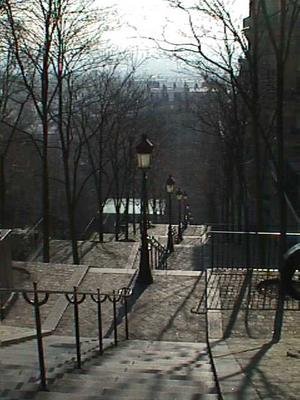
1/28, 10:pm, Paris time.
In room 403 of the Hotel de la Sorbonne. The hotel is a narrow little place, and feels very different--European, I suppose--compared to the ratholes I’m used to. But it’s fairly clean and in a great location.
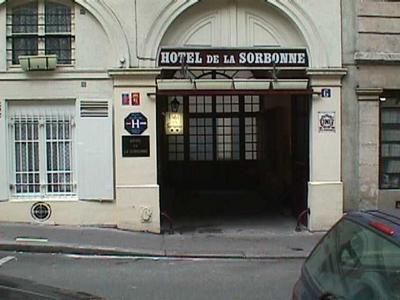
[I had ridden over on a cockpit jumpseat on a FedEx flite from Memphis.] We got to CDG and taxied to the cargo terminal which is, like every other airport on the planet, something separate from the passenger terminal (and naturally, without a car, one can't get anywhere from the cargo side of the airport). The crew wasn’t quite sure what customs would want to do with me, but I ended up riding in a FedEx crew van to customs with the rest of them--we were all waved thru--and they got out and took a cab to their hotel, which was right close to here, I guess. I had to fend for myself with the FedEx crew van driver, who was to take me to the main terminal and didn’t speak a lick of English (or didn’t want to). Anyway, I was told quietly to give him a little something, so I gave him the smallest thing I had, which was an American $5 bill. He seemed fine by this. Inside the main terminal--or at least the train area of CDG--I took a moment to orient myself and look over the several train options before finding my train number and stop. The guy in the booth spoke English, but they couldn’t take American money, so I had to change a $20 at a machine next to him. The ticket downtown was FF47, which I think was about $8. Compared to the L in Chicago, that seems awfully high; it’s about the same distance (19m). But the train was much nicer and very quiet, and it isn’t, after all, the Metro; so maybe the RER is more comparable to Chicago’s Metra, which I’ve not ridden.
It's a new experience for me to try to navigate on my own thru a foreign city, a place where I know no one and do not speak the language and do not even have ready access to assistance should I need it. We tunneled underground in the RER--so any hope of normal orientation is gone--and I managed to find the right stop and lug my stuff off the train and up the stairs to stand blinking in the late afternoon in the middle of a strange country. Though I had studied the maps beforehand, it was still a bit of a surprise to emerge from underground and begin to orient myself in reality to the faux map I had constructed in my head.
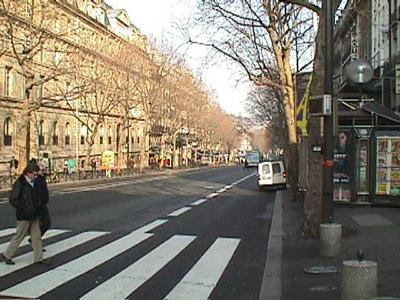
I managed to find my way to the hotel here without too much trouble, and there’s a young college guy working the desk who speaks a bit of English. I took the lift to the 4th floor (the lift is a tiny cube which would fit only two people max) and changed clothes and then headed out for a walk. I went over to St. Etienne-du-Mont, which, I was surprised to see, is only 3 or 4 blocks from here and just past the Place du Pantheon. It’s very cool to see the actual place where Durufle spent much of his creative, working life. Tomorrow I hope to go inside. The outside looks, well, very old. It's sad to see graffiti on the exterior doors, but it sits on the edge of some very narrow, twisty streets which it will be fun to explore. Durufle’s apartment is supposed to be in the immediate vicinity (overlooking the Place du Pantheon, I remember reading) and I had to have walked past it. Perhaps Madame Durufle was inside this very evening.
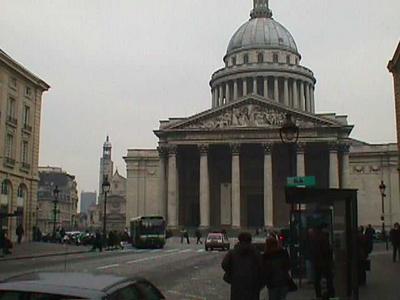
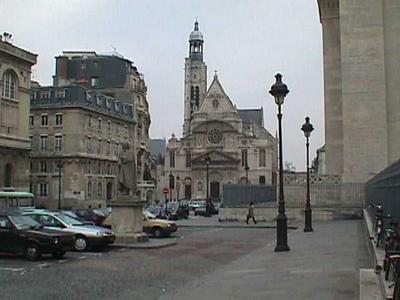
I then went to find some dinner, and I'm ashamed to admit that I defaulted to McDonalds since I didn’t feel like I had the energy for anything new. It’s tough to order, though, when they give different names to your old favorites. Oh well. Then, as night fell, a walk North to the Seine and East to have a look at Notre Dame, which is as awesome a building as one can find, I think. It seems so grand and huge and ornate that it’s impossible to imagine it EVER falling into a state of disrepair; how COULDN’T you realize the value of such a place? A visit tomorrow to the inside would also be cool.
Impressions: it’s cooler here than I expected--about 20°F and humid and breezy; there are lots and lots of motorcycles parked on the streets and being ridden, many of them scooters. The larger bikes tend to be the dual-purpose things, which seems like a trend or phase. The big road bikes--BMWs, Hondas, etc--seem reserved for the “serious biker," while the others are kind of default cheap transportation; I hear a fair amount of English being spoken, and it sounds American in accent. I guess it shouldn’t surprise me to find a lot of Americans here visiting & studying; things seem a bit smaller than I thought, with distances not too great. We’ll see how this impression plays out.
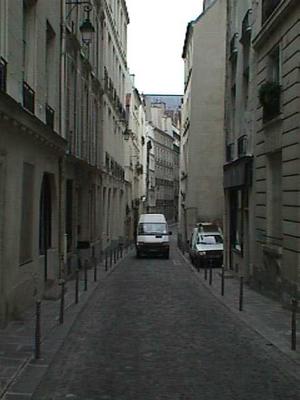
It’s only about 3:30 pm my time, but I’m pretty damned tired. I slept 3-4 hours on the flite over--and it wasn’t good sleep--so I’m due for some more. God knows what time I will be inclined to wake up in the morning. Chris should be here about 8 or 9. I plan to run in the morning.
1/29, 11:35am
I slept well until about 3:am, and then tossed and turned until 5:30 or so. When I thought about getting up, I managed to fall soundly asleep until 8:45 or so, and then there was a knock on the door and Chris was here. It seems a bit surreal to depart from our different points in the central US and, by differing routes, end up in this place (which is not even 1/2 as big as my STP shithole). He wanted to catch a few winks, so I went for a run, heading to the Seine and west to the Eiffel Tower and back for about 6. Not a bad run, but the surfaces are varied and there are a zillion streets to cross. Traffic is pretty unrelenting, and one must be cautious. I saw only one other runner at the water’s edge, and none on the streets, which seems odd.
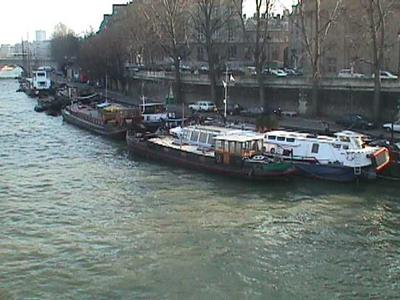
I passed a bunch of houseboats moored on the river’s edge. They are like barges which have been converted, and most seem 50-60’ long and would be quite spacious inside. The few uncurtained windows looked in on neat wood interiors with plants. I of course thought of Anais Nin, who lived for a while on one and wrote of it in her diaries. One wonders who gets to park where and what it costs to just tie up along the Seine in central Paris.
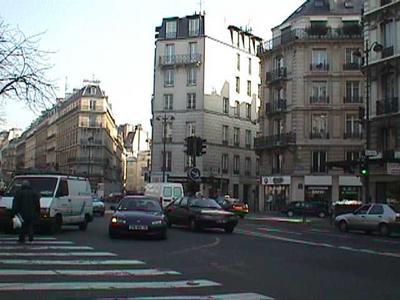
The whole surrounding when running is fantastic. I am reminded of New York in that every block seems to have something of note on it, but here the things of note extend back centuries, which is not a factor in New York, of course. I recognized the Louvre on the other side of the river as I ran and across from it, and on my side, the Musee d’Orsay. There are residential buildings all through this, and one wonders at the luxury of an existence here in old, central Paris.
Also, the automotive world. There are very few cars which one sees here and recognizes. I think it is because 2/3 of everything are Peugeots, Citroens, or Renaults, none of which is imported to America. I haven’t seen a single American car here, and even with familiar brands--Volvos, Mercedeses, BMWs, Toyotas, Subarus--the familiar models are slightly different or there are models not available in the US. Scooters are everywhere; they swarm thru traffic and it seems a really perilous existence to drive one. That makes me think of another comparison with New York: the streets here are almost all considerably narrower than anything in NYC, and it makes maneuvering quite a task. This is why all the cars are so tiny--a Jetta seems like a mid-size-to-large car. A truck like mine would be considerably larger than anything on the roads here except for an occasional delivery van, and our over-the-road trucks are mammoth compared to anything here. It would be nigh to impossible to park my truck here. People park on sidewalks or pathways or anywhere, and one can readily see the advantage of having a tiny car. Scooters are locked to lamp posts and fencing and anything fixed.
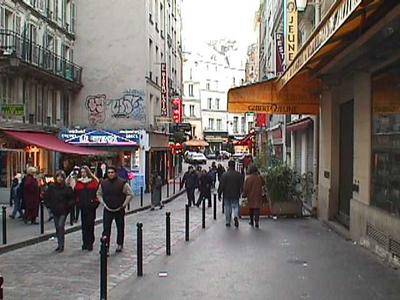
Today we’re headed out just anywhere. We haven’t discussed anything we need to see, but I’d like to see the insides of St. Etienne-du-Mont and Notre Dame, and I’d like to find St. Sulpice and see the inside and outside of that.
****************************

1/28, 10:pm, Paris time.
In room 403 of the Hotel de la Sorbonne. The hotel is a narrow little place, and feels very different--European, I suppose--compared to the ratholes I’m used to. But it’s fairly clean and in a great location.

[I had ridden over on a cockpit jumpseat on a FedEx flite from Memphis.] We got to CDG and taxied to the cargo terminal which is, like every other airport on the planet, something separate from the passenger terminal (and naturally, without a car, one can't get anywhere from the cargo side of the airport). The crew wasn’t quite sure what customs would want to do with me, but I ended up riding in a FedEx crew van to customs with the rest of them--we were all waved thru--and they got out and took a cab to their hotel, which was right close to here, I guess. I had to fend for myself with the FedEx crew van driver, who was to take me to the main terminal and didn’t speak a lick of English (or didn’t want to). Anyway, I was told quietly to give him a little something, so I gave him the smallest thing I had, which was an American $5 bill. He seemed fine by this. Inside the main terminal--or at least the train area of CDG--I took a moment to orient myself and look over the several train options before finding my train number and stop. The guy in the booth spoke English, but they couldn’t take American money, so I had to change a $20 at a machine next to him. The ticket downtown was FF47, which I think was about $8. Compared to the L in Chicago, that seems awfully high; it’s about the same distance (19m). But the train was much nicer and very quiet, and it isn’t, after all, the Metro; so maybe the RER is more comparable to Chicago’s Metra, which I’ve not ridden.
It's a new experience for me to try to navigate on my own thru a foreign city, a place where I know no one and do not speak the language and do not even have ready access to assistance should I need it. We tunneled underground in the RER--so any hope of normal orientation is gone--and I managed to find the right stop and lug my stuff off the train and up the stairs to stand blinking in the late afternoon in the middle of a strange country. Though I had studied the maps beforehand, it was still a bit of a surprise to emerge from underground and begin to orient myself in reality to the faux map I had constructed in my head.

I managed to find my way to the hotel here without too much trouble, and there’s a young college guy working the desk who speaks a bit of English. I took the lift to the 4th floor (the lift is a tiny cube which would fit only two people max) and changed clothes and then headed out for a walk. I went over to St. Etienne-du-Mont, which, I was surprised to see, is only 3 or 4 blocks from here and just past the Place du Pantheon. It’s very cool to see the actual place where Durufle spent much of his creative, working life. Tomorrow I hope to go inside. The outside looks, well, very old. It's sad to see graffiti on the exterior doors, but it sits on the edge of some very narrow, twisty streets which it will be fun to explore. Durufle’s apartment is supposed to be in the immediate vicinity (overlooking the Place du Pantheon, I remember reading) and I had to have walked past it. Perhaps Madame Durufle was inside this very evening.


I then went to find some dinner, and I'm ashamed to admit that I defaulted to McDonalds since I didn’t feel like I had the energy for anything new. It’s tough to order, though, when they give different names to your old favorites. Oh well. Then, as night fell, a walk North to the Seine and East to have a look at Notre Dame, which is as awesome a building as one can find, I think. It seems so grand and huge and ornate that it’s impossible to imagine it EVER falling into a state of disrepair; how COULDN’T you realize the value of such a place? A visit tomorrow to the inside would also be cool.
Impressions: it’s cooler here than I expected--about 20°F and humid and breezy; there are lots and lots of motorcycles parked on the streets and being ridden, many of them scooters. The larger bikes tend to be the dual-purpose things, which seems like a trend or phase. The big road bikes--BMWs, Hondas, etc--seem reserved for the “serious biker," while the others are kind of default cheap transportation; I hear a fair amount of English being spoken, and it sounds American in accent. I guess it shouldn’t surprise me to find a lot of Americans here visiting & studying; things seem a bit smaller than I thought, with distances not too great. We’ll see how this impression plays out.

It’s only about 3:30 pm my time, but I’m pretty damned tired. I slept 3-4 hours on the flite over--and it wasn’t good sleep--so I’m due for some more. God knows what time I will be inclined to wake up in the morning. Chris should be here about 8 or 9. I plan to run in the morning.
1/29, 11:35am
I slept well until about 3:am, and then tossed and turned until 5:30 or so. When I thought about getting up, I managed to fall soundly asleep until 8:45 or so, and then there was a knock on the door and Chris was here. It seems a bit surreal to depart from our different points in the central US and, by differing routes, end up in this place (which is not even 1/2 as big as my STP shithole). He wanted to catch a few winks, so I went for a run, heading to the Seine and west to the Eiffel Tower and back for about 6. Not a bad run, but the surfaces are varied and there are a zillion streets to cross. Traffic is pretty unrelenting, and one must be cautious. I saw only one other runner at the water’s edge, and none on the streets, which seems odd.

I passed a bunch of houseboats moored on the river’s edge. They are like barges which have been converted, and most seem 50-60’ long and would be quite spacious inside. The few uncurtained windows looked in on neat wood interiors with plants. I of course thought of Anais Nin, who lived for a while on one and wrote of it in her diaries. One wonders who gets to park where and what it costs to just tie up along the Seine in central Paris.

The whole surrounding when running is fantastic. I am reminded of New York in that every block seems to have something of note on it, but here the things of note extend back centuries, which is not a factor in New York, of course. I recognized the Louvre on the other side of the river as I ran and across from it, and on my side, the Musee d’Orsay. There are residential buildings all through this, and one wonders at the luxury of an existence here in old, central Paris.
Also, the automotive world. There are very few cars which one sees here and recognizes. I think it is because 2/3 of everything are Peugeots, Citroens, or Renaults, none of which is imported to America. I haven’t seen a single American car here, and even with familiar brands--Volvos, Mercedeses, BMWs, Toyotas, Subarus--the familiar models are slightly different or there are models not available in the US. Scooters are everywhere; they swarm thru traffic and it seems a really perilous existence to drive one. That makes me think of another comparison with New York: the streets here are almost all considerably narrower than anything in NYC, and it makes maneuvering quite a task. This is why all the cars are so tiny--a Jetta seems like a mid-size-to-large car. A truck like mine would be considerably larger than anything on the roads here except for an occasional delivery van, and our over-the-road trucks are mammoth compared to anything here. It would be nigh to impossible to park my truck here. People park on sidewalks or pathways or anywhere, and one can readily see the advantage of having a tiny car. Scooters are locked to lamp posts and fencing and anything fixed.

Today we’re headed out just anywhere. We haven’t discussed anything we need to see, but I’d like to see the insides of St. Etienne-du-Mont and Notre Dame, and I’d like to find St. Sulpice and see the inside and outside of that.
Wednesday, October 19, 2005
WARNING!! Boring Technical Airplane Post Ahead!

My assignment today was to provide "simulator support," to act as a regular pilot for other crewmembers who were being trained in an aircraft simulator. I occupy my regular pilot seat in the simulator, and we all do our regular jobs while we are put thru a series of (thankfully irregular) scenarios--failures and fires and windshear and severe thunderstorms and other assorted & sundry abnormalities, all the fun stuff the nervous passenger envisions while they should be sleeping the night before they fly.
This is one of those oddities about the airline industry, something tightly woven into the fabric of my working life but which probably has few analogs in other industries. I always think of this when I see a train pulling its load cross-country; everyone knows what a train is and generally how it operates, but nobody except an industry insider would have a clue about the huge number of strange job descriptions involved in getting that television set from a port in Seattle to a Pamida store in rural Missouri. There are a few visible, well-known jobs that represent a whole industry to people (like airline pilot). But this is always a tip-of-the-iceberg illusion.
Anyway. Everyone's job involves some degree of specializing in tasks the rest of the world is not privy to. This is hardly the place to detail in a single lump all the minutiae of airline life (it would make an excruciating read for most people anyway), but I think one aspect of all this is of some interest to many of us who fiddle with computers: the airplane simulator.
I've been trained in simulators for four of the five big airplanes in which I've made my living over the past decade, and I always emerge from these sessions gushing about the magic of simulation (and smarting from the emotional bruises inflicted therein).
A professional airline simulator is the ultimate in virtual reality, the result of a focused commitment to fool the human mind that hard-core gamers can only dream about. These are technological marvels costing many millions of dollars and requiring a small army of technicians to keep them operating smoothly (our sims, one or more for each airplane type in the fleet, are generally in use 20 hours of the day, so downtime is really not an option). The simulator, from the inside, is indistinguishable from the actual airplane cockpit--indeed, it's not an aesthetic mock-up, but actually constructed from the aircraft parts catalog; at least for the visible parts, if something breaks it gets fixed off the same shelves as the actual airplanes.

It's what's behind the visible panels that diverges sharply from the real airplane. And that's the magic. It's like Yul Brynner in "Westworld," where the skin is peeled away to reveal *gasp* a machine underneath. In the case of the DC-8, the simulator makes the airplane look like a haywagon: the computer technology needed to simulate flight requires many times the sophistication of the technology needed to construct the actual airplane! (Of course the real airplane does its own magic, carrying 355,000 lbs airborne.)
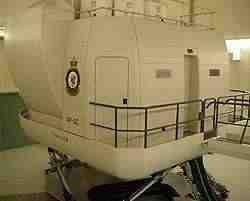 Each simulator--each one is dedicated to a single make & model & series of airplane--is a several-ton box capable of holding 6-8 people which floats 10-15 feet off the ground on six huge hydraulic cylinders. The victims cross a gangway and enter a closed world, where the windows look onto computer-generated graphics that are just shy of photorealism. Viewed from the outside, the simulator while in use tilts and lurches, simulating to the occupants inside the accelerations and sensations of flight, down to the thump of expansion joints in the concrete as we taxi out for takeoff. The illusion of being in an actual airplane--the focus of all this engineering--is so carefully designed and evolved, and so absolutely convincing, that we emerge from extensive training essentially qualified to fly an airplane around at 600 mph without ever having set foot in the actual thing. Given the complication of the task in question, this is nothing short of amazing.
Each simulator--each one is dedicated to a single make & model & series of airplane--is a several-ton box capable of holding 6-8 people which floats 10-15 feet off the ground on six huge hydraulic cylinders. The victims cross a gangway and enter a closed world, where the windows look onto computer-generated graphics that are just shy of photorealism. Viewed from the outside, the simulator while in use tilts and lurches, simulating to the occupants inside the accelerations and sensations of flight, down to the thump of expansion joints in the concrete as we taxi out for takeoff. The illusion of being in an actual airplane--the focus of all this engineering--is so carefully designed and evolved, and so absolutely convincing, that we emerge from extensive training essentially qualified to fly an airplane around at 600 mph without ever having set foot in the actual thing. Given the complication of the task in question, this is nothing short of amazing.Simulators have come into such ubiquity in airline life for a couple reasons. First, it costs so damned much to operate an airplane on an hourly basis that an airline simply can't afford to get a pilot (let alone 5,000 of them) up to speed on all the shit he or she needs to know before they're turned loose by training in the actual airplane (though a couple tasks are still accomplished in the airplane proper). And second, there's a lot of stuff that we can experience in a simulator that simply cannot be duplicated in a real airplane (at least not without killing the very person you're trying to enrich with the hair-raising experience). One is virtually always flying around with an engine not operating, for example (less of a big deal on an airplane like the DC-8, which has four of them). But control failures and landing gear failures and blown tires and catastrophic failures of electrical or hydraulic systems are examples of things you simply could not do in a real airplane, but which have real value for crewmembers to see from the safety of a simulator.
Real value, maybe, but it often isn't fun (even if it's fascinating)! Since even the simulator is hugely expensive to buy and operate, you're virtually never allowed to just fly around without something being on fire or falling off or failing to operate properly. And the same computer advancement that makes this kind of simulation possible also makes for creatively bizarre and tortuous training routines for we poor crewmembers! You emerge from this training environment like a lab rat on a heated surface, ready in a twitching, overstimulated way, for any eventuality.
Monday, October 17, 2005
I Got Nothin'
"Listen, if it ain't my business I got not a thing to say."
I thought about, in the absence of anything substantive to blog about, making lists of things about myself, like I've seen on so many sites.
But 100 things? I can't even think of 20 distinct things about me, let alone 100. Unless we count each pound of excess weight I've been carrying for 35 years. THAT would get me considerably closer. But I suppose they need to be interesting things, so I'm stuck again.
I thought about strange and diverse jobs I have held:
Less than 10. How about strange foods I like?
OK, that's the only strange food item I could think of. I'm batting zero.
Favorite movies? Already in the Blogger profile.
Favorite pieces of music? Yeah, so long as I also label the list "Effective General Population Sleep Aid."
Like I said: I got nuttin'.
I thought about, in the absence of anything substantive to blog about, making lists of things about myself, like I've seen on so many sites.
But 100 things? I can't even think of 20 distinct things about me, let alone 100. Unless we count each pound of excess weight I've been carrying for 35 years. THAT would get me considerably closer. But I suppose they need to be interesting things, so I'm stuck again.
I thought about strange and diverse jobs I have held:
--motorcycle salesman
--sleazy supper-club small combo drummer
--taxi driver
--city bus driver
--bartender (not an odd job, except that I'm a teetotaller)
--flight instructor
--miniature golf & resort groundskeeper
--drug store clerk
--Oh, yeah: airline pilot
Less than 10. How about strange foods I like?
--peanut butter & Miracle Whip sandwiches
OK, that's the only strange food item I could think of. I'm batting zero.
Favorite movies? Already in the Blogger profile.
Favorite pieces of music? Yeah, so long as I also label the list "Effective General Population Sleep Aid."
Like I said: I got nuttin'.
Saturday, October 15, 2005
See That My Grave is Kept Clean
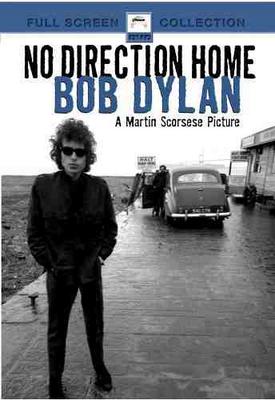
I spent the evening watching Martin Scorsese's Bob Dylan biopic, "No Direction Home." Though I've been aware of Dylan for all of my adult life, I haven't spent much time on him for a couple reasons. First, I think of him primarily as a poet, or at least as a poet first and a musician second.
That's how it seemed to me (and I'm not a poetry guy), probably for my second reason: I have what amounts to an obsession, really, with precision and deliberation in music. My tastes have always been magnetized toward music as a premeditated act of intellectual toil (e.g. Bach, again) rather than as a spontaneous outpouring of humanity (jazz). It's not that I thought of this latter approach as illegitimate or second-rate; but there is something in harmony, and in the deliberate working out of musical ideas, which grabbed me in a way that was beneath analysis or explanation. I have a zillion examples of this tendency of mine, but I fear we may slide on down the slope and never be heard from again. So.

Whatever else you might say about him, Dylan is not known for machine-like accuracy, for extraordinary musical precision. In many of his songs--without my having ever grasped the lyrical content (which is arguably my problem)--whatever he's doing, it ain't singing. He sounds like a kind of human theremin, with pitches (that is, "pitches") determined by infliction of pain. And with my little musical OCD that's an immediate disqualification. Angst-filled, polytonal melismatic poetry. To my ear it's like listening to the dentist's drill.
But it seems I'm the loser in the bargain, since he has amounted to something, historically, a bit like a key genetic mutation which brings some newfound functionality to an organism. And more fundamentally so than, say, the Stones, of whom I was reminded at the Rock & Roll Hall of Fame in Cleveland. (I confess I have not spent 30 total seconds thinking about the Rolling Stones in the past 20 years.) These two entities are not directly comparable, I know, but there is a sense of Dylan helping to light the torch that the Stones helped carry all these years. In my Johnny Come Lately way, I kinda missed the whole thing.
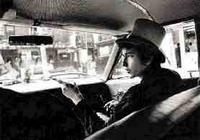 So the film, No Direction Home, is something of a revelation to me. When you point it out to me, I can see in the interviews and song segments that Dylan--the phenomenon of him--is something white-hot, greatness itself. But without the imprimatur of these luminaries--Allen Ginsberg, Pete Seeger, Scorsese himself--would I have recognized it? I guess already answered that.
So the film, No Direction Home, is something of a revelation to me. When you point it out to me, I can see in the interviews and song segments that Dylan--the phenomenon of him--is something white-hot, greatness itself. But without the imprimatur of these luminaries--Allen Ginsberg, Pete Seeger, Scorsese himself--would I have recognized it? I guess already answered that.In the end, that's what I'm left with. It's mesmerizing to see Bob Dylan blazing--burning--his way through life, leaving a traceable, scorched path behind him, the burned edges of which help to illuminate an age. The path seemed careening at first, but now looking back it seems a remarkably straight line, and it is life itself that is curved and careening. By contrast (not to invite a comparison between Bob Dylan and any facet of my humble self), I feel like I'm reacting my way along and I will look back at the end of it all hoping the pattern of reactions comprises something other than a mere random path. Maybe the straight paths are reserved for geniuses and artists only; it is then for the rest of us to follow in the furrows they have cut for us, lit by their reflected glow.
Yeah, or maybe he was just a zoned-out pothead who didn't give a fuck.
Anyway, the film: highly recommended!
This week's classic movie: Some Like It Hot.
Friday, October 14, 2005
The Nostalgia Train
I've been listening to Procol Harum's Whiter Shade of Pale, which always makes me a mite wistful.
(A digression: did you know the organ introduction to this song is an adaptation of the Air from Bach's Third Orchestral Suite? Seems that one or more of the band's members were Bach lovers--as am I. This particular Bach piece is usually referred to as "Air on the G String" on compilation albums at Wal-Mart, but it's justly famous; and the Bach-spawned introductory theme in Whiter Shade, played on the fabulous Hammond B-3--we should all genuflect now--is haunting and lugubrious and deliciously sad. It's interesting to listen to the two pieces back-to-back. Annie Lennox did a remake of Whiter Shade of Pale a few years ago, but decided to dump the Hammond and replace it with a synth patch. Bad choice. Take away the organ intro and what are you left with? It reminds me of a favorite line in "Miller's Crossing" about gangster Rug Daniels: "Not a bad guy... if looks, brains and personality don't count.")
So here I am, 1:am and thinking about 10 years ago. My divorce, long coming, arrived in the summer of 1996 and, as these things tend to do, scattered my ordered life to the winds. Pretty much overnite I was without a place to live, and had major decisions to make about work and material things. I found a friend with a vacant living room to accommodate my old Chickering 9 foot concert grand piano, put a futon bed and 20 racks of CDs and a stereo up in another friend's unused attic, and put the rest of my worldly possessions--a fold-out sofa, a desk, an easy chair, boxes of books, a TV, some clothes--in a room in an old office warehouse in downtown St. Paul. No kitchen, no bathroom: just a room. $130 a month. I was on the top floor of this turn-of-the-century office warehouse, which was not a residential building but a number of the painters and photographers and furniture makers who rented space there had set up housekeeping. So I joined their ranks, the itinerant pilot who comes and goes at all hours in his silly uniform. (It was an interesting room, high enough up that bugs were not a problem, and looking out on the final approach to the South runway at the St. Paul airport. I slept with the window open to the sounds of the city, the room suffused with a circus-peanut glow from the street lights below.)
I kept the things I was most likely to need--my cel phone charger, a change of clothes or two, a sleeping bag, a bottle of ibuprofen, my flying bags--in the back of my truck, and I basically lived for the next three years bouncing between these places and whatever hotel I was flying out of.
Man, that's a lifetime ago now. But it's fascinating to look back on how... unfettered I was then. I leaned on my friends a lot, but I was basically on the road flying 2 or more out of every 3 days. I don't think I could survive such an existence now.
It seems odd to look back fondly on something that was rather wretched at the time. But there is a vitality in living that way, a sense of living on the balls of one's feet, as it were, and not being tethered to a bunch of material bullshit. I certainly don't regret my mortgage and car payment now, and indeed life now is very, very good. But all these elements of "stability" close a lot of doors for one, it must be said. My opportunity to backpack around Europe for a summer is a couple decades behind me now, methinks.
iTunes makes it so easy to pick a soundtrack for your life, minute-by-minute.
Good Night.
(A digression: did you know the organ introduction to this song is an adaptation of the Air from Bach's Third Orchestral Suite? Seems that one or more of the band's members were Bach lovers--as am I. This particular Bach piece is usually referred to as "Air on the G String" on compilation albums at Wal-Mart, but it's justly famous; and the Bach-spawned introductory theme in Whiter Shade, played on the fabulous Hammond B-3--we should all genuflect now--is haunting and lugubrious and deliciously sad. It's interesting to listen to the two pieces back-to-back. Annie Lennox did a remake of Whiter Shade of Pale a few years ago, but decided to dump the Hammond and replace it with a synth patch. Bad choice. Take away the organ intro and what are you left with? It reminds me of a favorite line in "Miller's Crossing" about gangster Rug Daniels: "Not a bad guy... if looks, brains and personality don't count.")
So here I am, 1:am and thinking about 10 years ago. My divorce, long coming, arrived in the summer of 1996 and, as these things tend to do, scattered my ordered life to the winds. Pretty much overnite I was without a place to live, and had major decisions to make about work and material things. I found a friend with a vacant living room to accommodate my old Chickering 9 foot concert grand piano, put a futon bed and 20 racks of CDs and a stereo up in another friend's unused attic, and put the rest of my worldly possessions--a fold-out sofa, a desk, an easy chair, boxes of books, a TV, some clothes--in a room in an old office warehouse in downtown St. Paul. No kitchen, no bathroom: just a room. $130 a month. I was on the top floor of this turn-of-the-century office warehouse, which was not a residential building but a number of the painters and photographers and furniture makers who rented space there had set up housekeeping. So I joined their ranks, the itinerant pilot who comes and goes at all hours in his silly uniform. (It was an interesting room, high enough up that bugs were not a problem, and looking out on the final approach to the South runway at the St. Paul airport. I slept with the window open to the sounds of the city, the room suffused with a circus-peanut glow from the street lights below.)
I kept the things I was most likely to need--my cel phone charger, a change of clothes or two, a sleeping bag, a bottle of ibuprofen, my flying bags--in the back of my truck, and I basically lived for the next three years bouncing between these places and whatever hotel I was flying out of.
Man, that's a lifetime ago now. But it's fascinating to look back on how... unfettered I was then. I leaned on my friends a lot, but I was basically on the road flying 2 or more out of every 3 days. I don't think I could survive such an existence now.
It seems odd to look back fondly on something that was rather wretched at the time. But there is a vitality in living that way, a sense of living on the balls of one's feet, as it were, and not being tethered to a bunch of material bullshit. I certainly don't regret my mortgage and car payment now, and indeed life now is very, very good. But all these elements of "stability" close a lot of doors for one, it must be said. My opportunity to backpack around Europe for a summer is a couple decades behind me now, methinks.
iTunes makes it so easy to pick a soundtrack for your life, minute-by-minute.
Good Night.
Thursday, October 13, 2005
SCIENTISTS DISCOVER NEW ELEMENT

LOS ALAMOS, NM In a secret lab deep in the New Mexico desert, scientists believe they have unearthed a new element. The element is so elusive that, according to scientist Hiram Blackthorne, "we don't really understand anything about it except that it exists."
After years of intensive study, scientists still have only been able to surmise the element's existence thru its effects on other elements. "It's a catalyst for other reactions, that much is certain," said Dr. Blackthorne. But attempts to isolate the element and subject it to experiment have come up empty-handed. Scientists are not entirely sure that this very difficulty is not a direct effect of the element, tentatively called "Texasinine" or "Notmeium."
 Scientists first noticed something peculiar during the early days of the 2000 presidential campaign, when criticism of then-candidate George W. Bush came unexpectedly to naught. Large and glaring flaws of reasoning and character raised as campaign issues refused to lodge in the public mind or to arouse media attention. "At first we thought it was just business as usual in politics," said the lab's head scientist, Dr. Elizabeth Gronkman. "I mean, charges and counter-charges are thrown around all the time in a political campaign."
Scientists first noticed something peculiar during the early days of the 2000 presidential campaign, when criticism of then-candidate George W. Bush came unexpectedly to naught. Large and glaring flaws of reasoning and character raised as campaign issues refused to lodge in the public mind or to arouse media attention. "At first we thought it was just business as usual in politics," said the lab's head scientist, Dr. Elizabeth Gronkman. "I mean, charges and counter-charges are thrown around all the time in a political campaign."But after several months of jokes about Bush being a "teflon man" the scientists began to think there must be something else at work. This is when a serious study was undertaken, utilizing a little-known group of scientists in a small substation of the Los Alamos National Laboratory, known as the Center for Paranormal Pheremonal Chemistry and Spiritual Periods (CPPCSP).

Efforts initially focused on the state of Texas, since several campaign and administration workers and other key players hailed from the Lone Star State.
 "The degree to which Bush has been able to avoid shouldering responsibility for any of his administration's actions puts him in a very select group," said a research assistant who wished to remain anonymous. At this point, it hadn't yet struck the scientists to look for something other than a psychological explanation. "But," said Dr. Lucidius Q. Hangwell, CPPCSP's Director of Paranormal Chemistry, "one of our group decided to focus on Tom DeLay, and it was then we realized we were dealing with something entirely beyond political acumen. This was chemistry!" he said, with a glint in his eye. After a comprehensive study, scientists were able to see that the element was similarly at work in others involved in the campaign, and, subsequently, in the Bush Administration. "Tom DeLay, Karen Hughes, and now Harriet Miers," he said, his voice rising to an excited shout, "I mean, how fucking clear does it have to be?"
"The degree to which Bush has been able to avoid shouldering responsibility for any of his administration's actions puts him in a very select group," said a research assistant who wished to remain anonymous. At this point, it hadn't yet struck the scientists to look for something other than a psychological explanation. "But," said Dr. Lucidius Q. Hangwell, CPPCSP's Director of Paranormal Chemistry, "one of our group decided to focus on Tom DeLay, and it was then we realized we were dealing with something entirely beyond political acumen. This was chemistry!" he said, with a glint in his eye. After a comprehensive study, scientists were able to see that the element was similarly at work in others involved in the campaign, and, subsequently, in the Bush Administration. "Tom DeLay, Karen Hughes, and now Harriet Miers," he said, his voice rising to an excited shout, "I mean, how fucking clear does it have to be?"Initial studies focused on something environmental, something waterborne or in locally-raised beef. But the scientists have been unable to isolate the element. "It appears to be a super-slippery element," said Dr. Blackthorne. "Basically nothing can be made to stick in the presence of Texasinine." While compounds like Teflon were originally considered as an experimental starting point, after massive calculations the scientists concluded that they were dealing with something far more fundamental, probably a heretofore unknown element.

The element is so ethereal, according to Dr. Gronkman, that it would be placed somewhere above and to the left of hydrogen on the periodic table. "Just lighter than unobtanium," said Dr. Gronkman, referring to the newly-discovered element being used to fuel the Bush fiscal policy. "Say what you will, they're a cutting-edge administration chemically!"
Wednesday, October 12, 2005
My Dog Says "Don't Worry, Be Happy!"
OK, sorry.
This all just depresses me and pisses me off such that I can't help but rant. Even tho my rant comes to nothing.
Here's a happy picture of my thousand-year-old dog whose hearing is completely gone and vision is mostly gone and has only three good legs and only about half her teeth. But she's pretty happy. (Actually, she whines a lot, but with all that shit wrong who can blame her?)

She may not look it, but she's actually pretty happy here. (The tail wag is so slow that even the showest shutter speeds will capture it.) I think there are things I can learn from her.
I hope she's not too pissy about my having outed her in this way. She's more private than I am. But still, I think it would warm her heart to hear people who will now recognize her on the sidewalk say, "Love your work!" or "You're an inspiration!"
But, just as a heads-up, you gotta shout and wave your arms a lot.
This all just depresses me and pisses me off such that I can't help but rant. Even tho my rant comes to nothing.
Here's a happy picture of my thousand-year-old dog whose hearing is completely gone and vision is mostly gone and has only three good legs and only about half her teeth. But she's pretty happy. (Actually, she whines a lot, but with all that shit wrong who can blame her?)

She may not look it, but she's actually pretty happy here. (The tail wag is so slow that even the showest shutter speeds will capture it.) I think there are things I can learn from her.
I hope she's not too pissy about my having outed her in this way. She's more private than I am. But still, I think it would warm her heart to hear people who will now recognize her on the sidewalk say, "Love your work!" or "You're an inspiration!"
But, just as a heads-up, you gotta shout and wave your arms a lot.
Another Republican Mudslide
What a shocker. After some surprising and unexpected language from W in the wake of Katrina about poverty and race, and a stated commitment by him to make things right and to address some of the neglected, ugly corners of our culture, the inevitable about-face has occurred. Suddenly I feel as though someone has been peeing on me.
How does it go? Fool me twice... uh...don't get fooled again!
An article in yesterday's New York Times talks about how, far from enacting new measures to bring relief to the disaster areas, or even to extend existing programs (seemingly the easiest way to help people), Republicans are hard at work to cut funding for those existing programs, and to shift the expense of recovery and reconstruction away from those who actually have money. It seems even Republicans have begun to acknowledge that our commitments are wildly beyond our ability to pay.
The solution? Cut taxes on the rich and cut spending for the poor, of course. You say we're in desperate need of revenue? This will fix it: "Indeed, even as he was calling for deep spending cuts last week, Representative Mike Pence, Republican of Indiana, who leads the conservative caucus, called tax reductions for the prosperous a key to fighting poverty." This sounds to me like saying that the best way to lose weight is to eat twice your daily allotment of total calories in the form of Peanut M&Ms.
Trust me, this doesn't work.
This rationale sounds like the same wheezy old supply-side song, the stupefying claim that the really wealthy are all that matter in the economy: if we take care of the rich, the rich will lift us up on their gold-leaf platter. (Never mind that Clinton's 1993 tax increases seem to disprove everything about this theory, as does the current state of the economy--and poverty rates--after W's massive handout for the wealthy from his first term.) But I'm just not able anymore to see this administration as well meaning but misguided.
A Paul Krugman column after the hurricane said that the relief debacle was the predictable outcome from a group of people who don't believe that government can help people, or that it's even the government's place to help people.
But the administration is not admitting to any of this. Instead we get more lies and spin, lies and spin. W quietly suspended the Davis-Bacon Act, a 1931 law requiring reconstruction projects to pay at least an average local wage. And the administrations argument for this, when Halliburton is allowed multi-billion dollar no-bid contracts (you can be damn sure that Halliburton is getting substantially more than the local average)? They claim that the suspension, which applied only to storm areas, would benefit local residents by "stretching financial resources."
Meanwhile, another $70 billion in tax reductions for the wealthy, agreed to in the Spring, are moving forward and are not even on the table for consideration in this crisis. Couldn't we use, say, this $70B to "benefit local residents?"
This is the tactic, folks: say what is necessary to get people to stop caterwauling, having no intention whatsoever to do what you say, either in particulars or even in broad strokes. It is a truism that the best way to propagate a lie is for the liar to actually believe the lie. It may be known as a lie up top, but it's stated to the minions, who go forth and spread the lie as gospel. This is pure Karl Rove, and he has coached W well. It's the cornerstone of W's modus operandi that you be able to convincingly say things you pointedly don't believe. But the minions will believe.
Isn't the brave and upright thing to state the truth simply, even if it's painful? Well, no. Not if you're effecting a revolution underneath the noses of a public that desires no such thing. Because no informed voter, or at least no voter that's not both very rich and not burdened with a social conscience, would endorse either the world dreamt of by W's team or the brutal tactics in their secret handbook.
How does it go? Fool me twice... uh...don't get fooled again!
An article in yesterday's New York Times talks about how, far from enacting new measures to bring relief to the disaster areas, or even to extend existing programs (seemingly the easiest way to help people), Republicans are hard at work to cut funding for those existing programs, and to shift the expense of recovery and reconstruction away from those who actually have money. It seems even Republicans have begun to acknowledge that our commitments are wildly beyond our ability to pay.
The solution? Cut taxes on the rich and cut spending for the poor, of course. You say we're in desperate need of revenue? This will fix it: "Indeed, even as he was calling for deep spending cuts last week, Representative Mike Pence, Republican of Indiana, who leads the conservative caucus, called tax reductions for the prosperous a key to fighting poverty." This sounds to me like saying that the best way to lose weight is to eat twice your daily allotment of total calories in the form of Peanut M&Ms.
Trust me, this doesn't work.
This rationale sounds like the same wheezy old supply-side song, the stupefying claim that the really wealthy are all that matter in the economy: if we take care of the rich, the rich will lift us up on their gold-leaf platter. (Never mind that Clinton's 1993 tax increases seem to disprove everything about this theory, as does the current state of the economy--and poverty rates--after W's massive handout for the wealthy from his first term.) But I'm just not able anymore to see this administration as well meaning but misguided.
A Paul Krugman column after the hurricane said that the relief debacle was the predictable outcome from a group of people who don't believe that government can help people, or that it's even the government's place to help people.
"...The federal government's lethal ineptitude wasn't just a consequence of Mr. Bush's personal inadequacy; it was a consequence of ideological hostility to the very idea of using government to serve the public good. For 25 years the right has been denigrating the public sector, telling us that government is always the problem, not the solution."
But the administration is not admitting to any of this. Instead we get more lies and spin, lies and spin. W quietly suspended the Davis-Bacon Act, a 1931 law requiring reconstruction projects to pay at least an average local wage. And the administrations argument for this, when Halliburton is allowed multi-billion dollar no-bid contracts (you can be damn sure that Halliburton is getting substantially more than the local average)? They claim that the suspension, which applied only to storm areas, would benefit local residents by "stretching financial resources."
Meanwhile, another $70 billion in tax reductions for the wealthy, agreed to in the Spring, are moving forward and are not even on the table for consideration in this crisis. Couldn't we use, say, this $70B to "benefit local residents?"
This is the tactic, folks: say what is necessary to get people to stop caterwauling, having no intention whatsoever to do what you say, either in particulars or even in broad strokes. It is a truism that the best way to propagate a lie is for the liar to actually believe the lie. It may be known as a lie up top, but it's stated to the minions, who go forth and spread the lie as gospel. This is pure Karl Rove, and he has coached W well. It's the cornerstone of W's modus operandi that you be able to convincingly say things you pointedly don't believe. But the minions will believe.
Isn't the brave and upright thing to state the truth simply, even if it's painful? Well, no. Not if you're effecting a revolution underneath the noses of a public that desires no such thing. Because no informed voter, or at least no voter that's not both very rich and not burdened with a social conscience, would endorse either the world dreamt of by W's team or the brutal tactics in their secret handbook.
Monday, October 10, 2005
Cleveland
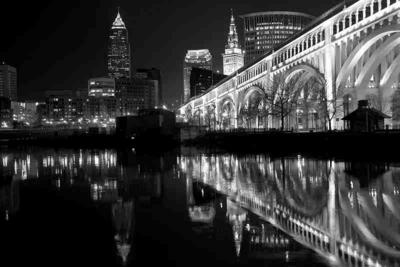
This is my first visit to this place. I had the whole day today to kill, since I don't go to work until about 10:pm tonite, so I caught the train from near my hotel into the city this morning and spent a few hours walking around. This is something of a routine for me in a new place, to walk the streets and try to get a handle on a new setting. On a gut level, do I get a positive vibe out of the place? Could I see myself living here? I usually have no map or guide, so I just walk and look and react. This is one of my favorite ways to spend a day.
My hotel seems to be separated from the downtown, to judge from the train ride, by about 10 miles of industrial grunge (I guess this stuff always surrounds railroad tracks). The train runs above ground, but on a protected right of way with freight trains running alongside. Still, due to construction or something we ambled along at oxcart pace, and at least one very irritated passenger got fed up and left the train in a huff. The train itself appeared quite tired, and was not terribly busy at 9:30 am. We all had to make our way up front when we boarded to pay our fare into a farebox like I used to have on my bus in Minneapolis a decade ago. This is odd, since most train systems I've seen let you buy a ticket in the station where you board. This seems a concession to economy, but it taxes the lone train operator to ensure that everybody pays their fare. Still, kudos for having the trains in the first place. I admit to my long-held belief that a city without passenger trains is not really a city.
The terminal downtown, at the base of a couple high rises called "Tower City," was nicer and more modern than anything we saw on the ride in, and the station opens up into a shopping & eating complex along the lines of New York's Penn Station (though obviously a good deal smaller). This seemed a very nice hub for commuters as they come and go.
My destination as I walked around was the Rock and Roll Hall of Fame and Museum. The portion of the city I walked thru to and from the museum had no residences that I saw, and seemed deadly quiet, like any Wisconsin town when the Packers are playing (think Andromeda Strain). Kansas City seems exactly like this, and the quietude and inactivity results in kind of a pall hanging over everything, as though the buildings and wide streets are artifacts of a vitality now long gone. I passed no restaurants once I left the train terminal, which corresponds to there not being many residents, at least in this part of downtown (but what of the workers?). It's too bad, since the city is on Lake Erie. The waterfront that I saw had an industrial feeling about it, harking back to the ways of commerce from 100 years ago, but these settings have been very successfully translated into hip, urban residential areas in other cities; this seemed like an ideal place to do this. I saw little enough of the place, so perhaps this is underway already in other parts.

The Rock & Roll Hall of Fame was quite cool. It sits on right on Lake Erie, next to the Great Lakes Science Center and Browns Stadium. The huge, glass pyramid was designed by I.M. Pei and instantly reminds one of his similar pyramid in the Louvre. But for the new-ish Science Center next door the modernity would seem out of place amid the warehouses and wharves. But that's its ingenious charm in Paris, and it has a similarly jarring-yet-endearing effect here.
I'm not a rock and roll fanatic in general. Though music is my primary passion, there are many branches on the tree of music which do not speak to me (or with which I am unfamiliar), and the rock and roll stuff that I really care about represents so small a portion of the history of popular music that I was not strongly motivated to see the hall of fame. Often, when I am flipping radio stations in the car (frantic to avoid advertising) I become depressed at how little new and vital there seems to be in music, and how futile it seems for each generation--each high school class, practically--to have "their OWN voice" under the broader heading of rock music. (I guess it's all more vital, or at least more current, than the guys I listen to, some of whom have been feeding worms now for centuries.)
But to see the timeline of this music reduced to its key milestones, and to see a broad overview of the cultural changes we've lived thru in the past 40-50 years, gives a shape and a more coherent directional arrow to this. The chicken-and-egg symbiosis between the rapidly-evolving culture and the rapidly-evolving musical genre is fascinating to think on, and the museum does a fantastic job of giving a context to all these happenings. The films of rock's earliest days, of Fats Domino and Chuck Berry, of Elvis Pressley and the Beatles, of The Stones and The Who, of Motown in the '50s and '60s and of San Francisco in the '60s and '70s: these things take the tepid commercialism of current radio acts and, like wearing a pair of 3-D glasses, show the current music to be the thin edge of a blade which has cut a deep scar thru world culture.
I guess I gotta take their word on rap, tho.
Sunday, October 9, 2005
Planet Earth at Aphelion
Poor conservatives! After years of liberal restrictions on the basic human right to forcibly shove Jesus down the throats of all the stupid degenerates who cannot be made to see the light (so much for the supposed value of education!), here it appears that W is squandering the chance for which they've been waiting since the moment they learned how to control people. This is an opportunity as rare as the alignment of our solar system's planets (well, in the mythological scientific world sold to us by liberals for all these years in their efforts to kill God); here W has the chance not simply to start moving the court's alignment to the far right, but to take the first steps in a comprehensive retooling of the American Dream. A dream where mothers who don't want to be pregnant are shown the boot or the jail cell; where doctors who assist women with these decisions are hunted down and prosecuted, with a gun (in every home!) if necessary; a world where a coat hanger is never just a coat hanger; where it's made clear from Day One to young school students that Jesus Is Lord. And these are just the obvious things! Who knows what other exciting revelations await in this grand vision of homespun decency and moral rectitude?
What an opportunity: it's an alignment of the planets of conservatism, if you will, that we've not seen since the halcyon days of despotic kingly rule. And what does W do? Leaving his playbook behind and just winging it, he appoints someone with nothing like the proper background and whose prime qualifications seem to be an unquestioned fealty to The Man Himself and a willingness to publicly admit to a radical personal transformation at the hands of an imaginary friend. The same imaginary friend, not coincidentally, that saved W himself from everything he is. (Or was before the imaginary friend thing.) Talk about a lost opportunity! I mean, you're only gonna get a candidate like that thru a congress where the whole lot of them are embracing their imaginary friends. (Hey, Tom Delay has experience bringing that about.) Anyway, this approach to choosing candidates stands in stark contrast to W's past practice of appointing to important posts people with rich and exemplary qualifications, even when their views differed from his own...
Oh, God! I got off track! I was thinking of another president entirely! I'm reading Michael O'Brien's new biography of JFK, and this was his approach to appointments. It's easy to confuse the two guys, though...
What an opportunity: it's an alignment of the planets of conservatism, if you will, that we've not seen since the halcyon days of despotic kingly rule. And what does W do? Leaving his playbook behind and just winging it, he appoints someone with nothing like the proper background and whose prime qualifications seem to be an unquestioned fealty to The Man Himself and a willingness to publicly admit to a radical personal transformation at the hands of an imaginary friend. The same imaginary friend, not coincidentally, that saved W himself from everything he is. (Or was before the imaginary friend thing.) Talk about a lost opportunity! I mean, you're only gonna get a candidate like that thru a congress where the whole lot of them are embracing their imaginary friends. (Hey, Tom Delay has experience bringing that about.) Anyway, this approach to choosing candidates stands in stark contrast to W's past practice of appointing to important posts people with rich and exemplary qualifications, even when their views differed from his own...
Oh, God! I got off track! I was thinking of another president entirely! I'm reading Michael O'Brien's new biography of JFK, and this was his approach to appointments. It's easy to confuse the two guys, though...
Saturday, October 8, 2005
The Opposite End of the Chick Magnet
I'm Stuck in Louisville for a couple days, before heading to Cleveland tomorrow to fly for the week.
I keep an apartment in Louisville with four other guys. None of us lives here, but we spend so much time here for work that we set up a crash pad to save on hotel costs. The apartment itself is a crumbling rathole, but it's in a fantastic part of town. We're right next to a huge Frederick Law Olmstead-designed park, and within walking distance of a bajillion cool restaurants and shops and coffee houses and movie theaters; the whole area is a progressive contrast to the "Old South" spin of much of the rest of Louisville (the city prides itself on being the Northernmost point of The South. Indianapolis, 100 miles North, feels very different).
But the apartment. It's a converted garage (in a feat of supreme optimism, it said "carriage house" in the for-rent ad in the local paper) for a 150-year-old house in the "old money" part of Louisville. Like the Lord of the Flies, five middle-aged guys living in an apartment exposes some very basic truths about humanity. Or at least about maleness. A Nordic Track ski machine sits where the dining room ought to be, usually draped with somebody's moist running clothes. The walls are covered with cockpit study diagrams for three different airplanes. A tired '70s Goodwill sofa squats before a dust-covered X-Box and ancient television. Another ratty chair and a plastic outdoor lawn chair complete the living room ensemble. In the kitchen (it's all actually one room), a wobbly card table with two chairs gives the illusion of a hovering mound of godknowswhat, but for the small bulldozed clearing at one of the chairs where a bowl of cereal can sit (and clearly has many times). The blinds are permanently drawn, and the bedroom windows upstairs have dark blankets, "blackout curtains," nailed up over them (since we sleep at very strange hours).
My wife comes down to visit a few times per year (when I know I'll be in town for my work week) and the crash pad "housekeeping" is a source of profound distress to her. She nearly insisted last time that we go to a hotel because of the kitchen floor. She will only use the bathroom at night and with the light off. She wears shoes in the shower. She has been bitching about the same immense cobweb in a corner of the ceiling of my bedroom now for four years. (Come on, lady! Get over it!)(There are cobwebs in two other bedroom ceiling corners as well, but they're not so spectacular.) The landlord, who lives in the main house on the property, came in for a visit a few months back and decided that cleaning the carpeting was simply not realistic. We're now studiously at work degrading the new carpeting. A similar approach to the bathroom was probably warranted before we moved in. I leave its current condition, four years later, to your vivid imaginations.
The only decoration in the whole place is a collection of Chinese restaurant calendars and two seasons of baseball game tickets stubs stuck on a nail in the kitchen. Oh yeah, and a framed photo of my 1981 Cadillac Piece-O-Shit airport car being winched onto a flatbed truck a couple years ago for its trip to the crusher. Ah, good times. We prefer to leave the decorating to Mother Nature (see the cobweb comment above). We had a female roommate for a while a couple years back (she immortalized that Cadillac Moment), but when her girlfriends started to refuse to come into the apartment she moved out and has not spoken to any of us since.
What's up with that?
I keep an apartment in Louisville with four other guys. None of us lives here, but we spend so much time here for work that we set up a crash pad to save on hotel costs. The apartment itself is a crumbling rathole, but it's in a fantastic part of town. We're right next to a huge Frederick Law Olmstead-designed park, and within walking distance of a bajillion cool restaurants and shops and coffee houses and movie theaters; the whole area is a progressive contrast to the "Old South" spin of much of the rest of Louisville (the city prides itself on being the Northernmost point of The South. Indianapolis, 100 miles North, feels very different).
But the apartment. It's a converted garage (in a feat of supreme optimism, it said "carriage house" in the for-rent ad in the local paper) for a 150-year-old house in the "old money" part of Louisville. Like the Lord of the Flies, five middle-aged guys living in an apartment exposes some very basic truths about humanity. Or at least about maleness. A Nordic Track ski machine sits where the dining room ought to be, usually draped with somebody's moist running clothes. The walls are covered with cockpit study diagrams for three different airplanes. A tired '70s Goodwill sofa squats before a dust-covered X-Box and ancient television. Another ratty chair and a plastic outdoor lawn chair complete the living room ensemble. In the kitchen (it's all actually one room), a wobbly card table with two chairs gives the illusion of a hovering mound of godknowswhat, but for the small bulldozed clearing at one of the chairs where a bowl of cereal can sit (and clearly has many times). The blinds are permanently drawn, and the bedroom windows upstairs have dark blankets, "blackout curtains," nailed up over them (since we sleep at very strange hours).
My wife comes down to visit a few times per year (when I know I'll be in town for my work week) and the crash pad "housekeeping" is a source of profound distress to her. She nearly insisted last time that we go to a hotel because of the kitchen floor. She will only use the bathroom at night and with the light off. She wears shoes in the shower. She has been bitching about the same immense cobweb in a corner of the ceiling of my bedroom now for four years. (Come on, lady! Get over it!)(There are cobwebs in two other bedroom ceiling corners as well, but they're not so spectacular.) The landlord, who lives in the main house on the property, came in for a visit a few months back and decided that cleaning the carpeting was simply not realistic. We're now studiously at work degrading the new carpeting. A similar approach to the bathroom was probably warranted before we moved in. I leave its current condition, four years later, to your vivid imaginations.
The only decoration in the whole place is a collection of Chinese restaurant calendars and two seasons of baseball game tickets stubs stuck on a nail in the kitchen. Oh yeah, and a framed photo of my 1981 Cadillac Piece-O-Shit airport car being winched onto a flatbed truck a couple years ago for its trip to the crusher. Ah, good times. We prefer to leave the decorating to Mother Nature (see the cobweb comment above). We had a female roommate for a while a couple years back (she immortalized that Cadillac Moment), but when her girlfriends started to refuse to come into the apartment she moved out and has not spoken to any of us since.
What's up with that?
Tuesday, October 4, 2005
DELAY ABOLISHES U.S. GOVERNMENT
Washington, DC--Tom DeLay today abolished Congress and declared himself "The Supreme Jesus" of the United States.

Dressed in priestly vestments, DeLay impatiently brushed aside urgent questions about the separation of church and state, saying, " I don't believe there is a separation of church and state. I think the Constitution is very clear. The only separation is that there will not be a government church." He added, "I ain't no god-damned church!" and shot dead a reporter poised to ask for clarification.
The deposed House Majority Leader, who was facing indictment on conspiracy and money laundering charges before he dismissed the judicial branch, referred to himself as "Mr. Super-President" and pronounced Grande DeLayed Fatwah No. 1, calling for "instant death" to anyone found disagreeing with him
Later, from the Oval Office, this time dressed in a Navy Admiral's uniform, Commander DeLay spoke to reporters after sacking the executive branch. "These are trying times," Admiral Supreme Jesus declared, "and I'm sick to death of being kicked around by [women] and [minorities] and all these god-damned bottom-feeding [liberals] who hate America! So I'm-a-gonna clean up this shit-hole!"

In an interview later in the day on Fox News he declared, "I'm no longer a superpower. I'm a super-duper power."
The transformation of DeLay from adherent to the rule of law to the Supreme Law Giver is difficult to trace, as his commitment to legal principles was abandoned prior to the advent of written records.
But recapping recent events, things really began to unravel after DeLay's indictment last week on charges of conspiracy to violate Texas election law. After initially insisting there were no laws in Texas governing either the election process or any behavior he declared to be "moral," he then attacked prosecutor Ronnie Earle: "This is one of the weakest, most baseless indictments in American history. It's a sham, and Mr Earle knows it." He then declared Earle to be "one dead [liberal]."
That might have been the end of it, but DeLay was indicted for a second time less than a week later, this time by a Texas Grand Jury, on charges of money laundering and conspiracy to launder money. In response, the former U.S. House majority leader, dressed in camouflage and facial paint, called the proceedings ''an abomination of justice.'' When sympathetic Senate Majority Leader Bill Frist added, apparently in a show of solidarity with DeLay, that the proceedings were "an abortion of justice," DeLay pulled a pistol and shot Frist dead. "I will not have that word spoken in my presence," he declared as the pressroom cleared in a stampede. "Senator Frist was a good man, he simply advocated a bad policy," he said, looking at the smoking corpse. "Now, that's just not something we can have. You're either with me, or... or... shit, you're pretty much [screwed]!"
He then declared the entire Texas Grand Jury to be "as dead as their spouses and children are gonna be."
Questions were immediately raised about governmental intervention in the crisis, but Delay abruptly brushed the suggestions aside. "I AM the federal government," he said.
Democratic senator Russ Feingold, from behind a protective barracade of bullet-proof glass, asked flinchingly about DeLay's carriage of a gun into the Senate chamber, and Delay brandished his weapon and stated to the cameras, "Guns have little or nothing to do with violence. The causes of violence are working parents who put their kids into daycare, the teaching of evolution in the schools, and working mothers who take birth control pills." He then unloaded his magazine at Feingold, who escaped, shaken but unhurt.
Later in the evening, Grande Admiral Super-DeLay de Power Jesus spoke to a huge crowd of armed soldiers surrounding the White House "for the government's protection." He stated to the festive, book-burning crowd that due to the vitality of his role as Grande Supreme Jesus, henceforth he would pay no taxes. "Make no mistake, this is all-out war," he said. "Nothing is more important in the face of a war than cutting taxes."
As night fell on the Capitol, a steady exodus of moderate and liberal lawmakers leaving the city could be seen clogging all roadways. "This is too toxic an environment for me," said Illinois Senator Barack O'Bama.
But Supreme Jesus was having none of it: "It has never been proven that air toxics are hazardous to people. Even to [black people]." He unhooked his leash from the new White House Mascot. "Go get 'im, Rove(r)," he said with a wry smile.

Dressed in priestly vestments, DeLay impatiently brushed aside urgent questions about the separation of church and state, saying, " I don't believe there is a separation of church and state. I think the Constitution is very clear. The only separation is that there will not be a government church." He added, "I ain't no god-damned church!" and shot dead a reporter poised to ask for clarification.
The deposed House Majority Leader, who was facing indictment on conspiracy and money laundering charges before he dismissed the judicial branch, referred to himself as "Mr. Super-President" and pronounced Grande DeLayed Fatwah No. 1, calling for "instant death" to anyone found disagreeing with him
Later, from the Oval Office, this time dressed in a Navy Admiral's uniform, Commander DeLay spoke to reporters after sacking the executive branch. "These are trying times," Admiral Supreme Jesus declared, "and I'm sick to death of being kicked around by [women] and [minorities] and all these god-damned bottom-feeding [liberals] who hate America! So I'm-a-gonna clean up this shit-hole!"

In an interview later in the day on Fox News he declared, "I'm no longer a superpower. I'm a super-duper power."
The transformation of DeLay from adherent to the rule of law to the Supreme Law Giver is difficult to trace, as his commitment to legal principles was abandoned prior to the advent of written records.
But recapping recent events, things really began to unravel after DeLay's indictment last week on charges of conspiracy to violate Texas election law. After initially insisting there were no laws in Texas governing either the election process or any behavior he declared to be "moral," he then attacked prosecutor Ronnie Earle: "This is one of the weakest, most baseless indictments in American history. It's a sham, and Mr Earle knows it." He then declared Earle to be "one dead [liberal]."
That might have been the end of it, but DeLay was indicted for a second time less than a week later, this time by a Texas Grand Jury, on charges of money laundering and conspiracy to launder money. In response, the former U.S. House majority leader, dressed in camouflage and facial paint, called the proceedings ''an abomination of justice.'' When sympathetic Senate Majority Leader Bill Frist added, apparently in a show of solidarity with DeLay, that the proceedings were "an abortion of justice," DeLay pulled a pistol and shot Frist dead. "I will not have that word spoken in my presence," he declared as the pressroom cleared in a stampede. "Senator Frist was a good man, he simply advocated a bad policy," he said, looking at the smoking corpse. "Now, that's just not something we can have. You're either with me, or... or... shit, you're pretty much [screwed]!"
He then declared the entire Texas Grand Jury to be "as dead as their spouses and children are gonna be."
Questions were immediately raised about governmental intervention in the crisis, but Delay abruptly brushed the suggestions aside. "I AM the federal government," he said.
Democratic senator Russ Feingold, from behind a protective barracade of bullet-proof glass, asked flinchingly about DeLay's carriage of a gun into the Senate chamber, and Delay brandished his weapon and stated to the cameras, "Guns have little or nothing to do with violence. The causes of violence are working parents who put their kids into daycare, the teaching of evolution in the schools, and working mothers who take birth control pills." He then unloaded his magazine at Feingold, who escaped, shaken but unhurt.
Later in the evening, Grande Admiral Super-DeLay de Power Jesus spoke to a huge crowd of armed soldiers surrounding the White House "for the government's protection." He stated to the festive, book-burning crowd that due to the vitality of his role as Grande Supreme Jesus, henceforth he would pay no taxes. "Make no mistake, this is all-out war," he said. "Nothing is more important in the face of a war than cutting taxes."
As night fell on the Capitol, a steady exodus of moderate and liberal lawmakers leaving the city could be seen clogging all roadways. "This is too toxic an environment for me," said Illinois Senator Barack O'Bama.
But Supreme Jesus was having none of it: "It has never been proven that air toxics are hazardous to people. Even to [black people]." He unhooked his leash from the new White House Mascot. "Go get 'im, Rove(r)," he said with a wry smile.
We Got Electricity and Runnin' Water and Everything!

A new theater opened about six months ago in Appleton. Called The Big Picture, it has a screen measuring 60 X 80 feet, and the seating is such that nobody is very far from this gigantic screen. The image appears so huge you almost can 't take it all in, which is fabulous for immersing you in the movie experience. It's a beautiful, state of the art facility.
This is all well and good. But, like an IMAX theater, there are just a limited number of films released for this kind of 70mm projector, and all their programming has been focused on adventure stories, much like you'd see on the National Geographic channel. And at $8.50 for an hour long show, it just hasn't shaped up as a place a parent takes their kid on a weekly basis. What seemed like maybe a questionable premise for a town of 70,000 quickly becomes a dubious business proposition.
Now, as though someone had engaged me with a secret mind meld (actually, there were many requests registered, mine not among them), The Big Picture recently announced a new initiative: their "Great Movies Series," where they will play each week a movie from the American Film Institute's 100 Greatest Films. The showings of these classic films are interspersed with their regular programming, with matinees on Saturday and Sunday, and a showing Tuesday nights at 8:15. Apparently, special 70mm versions of these films are available, so that a second projector was not needed to show these classics.
This announcement made me giddy as a Republican with a loaded firearm! Week One was "The Sting."
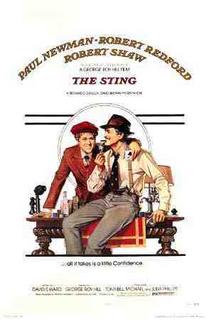
Week Two, "Casablanca."

This week's show was "An American in Paris."

And next week will be "Citizen Kane."

How cool is that? I own all these films on DVD (as my wife reminds me when I blow yet another $20 to see a movie I could watch at home for free), but seeing them in the theater--especially this theater--is another thing altogether. This is magic.
And here everybody thought we ain't got no culture here in CheeseLand.
_________________________
Speaking of old movies, I have to raise my glass to Turner Classic Movies' latest print ad campaign for the Classics. (I tried to find some of these posters online, but was not successful.)
The latest one for North By Northwest shows the famous image of Cary Grant running from the crop dusting airplane, with the following caption:
When you barely miss your plane, that's FRUSTRATING. When your plane barely misses you, that's CLASSIC.
My favorite was for Hitchcock's Psycho:
A grown man living with his mother, that's PATHETIC. A grown man living with his dead mother, that's CLASSIC.
Bravo!
Subscribe to:
Comments (Atom)